Feed aggregator
Teaser Tuesdays - The Unseelie Throne
 “You…you know?”“Not in as many words. He has not said it to me.” She broke off a piece of bread on her plate and fiddled with it idly.
“You…you know?”“Not in as many words. He has not said it to me.” She broke off a piece of bread on her plate and fiddled with it idly.(page 99, The Unseelie Throne by Kathryn Ann Kingsley)
---------
Teaser Tuesdays is a weekly bookish meme, previously hosted by MizB of Should Be Reading. Anyone can play along! Just do the following: - Grab your current read - Open to a random page - Share two (2) “teaser” sentences from somewhere on that page BE CAREFUL NOT TO INCLUDE SPOILERS! (make sure that what you share doesn’t give too much away! You don’t want to ruin the book for others!) - Share the title & author, too, so that other TT participants can add the book to their TBR Lists if they like your teasers!
In Defence of Purple Prose
 Image by Gerd Altmann from Pixabay
Image by Gerd Altmann from Pixabay
Good afterevenmorn, Readers!
Language is fun. The way words can mean more than one thing, depending on where the stress is placed, or its location in a sentence, and where that sentence lies within the tale. It is a playground. A song devising its own music. A melody murmured that can delight not just the eyes, but the ears. How many have paused a read simply to revel in the words just read? To read and reread a sentence? To bask in the brilliance of a cleverly turned phrase?
 Image by Лариса Мозговая from Pixabay
Image by Лариса Мозговая from Pixabay
Yet so many decry the joy in that play. Brevity, they proclaim, is king. Only he shall rule the pages, painted words slinking away beneath his stern gaze. That is good writing. The only good writing.
In truth, he is but a soldier, which, like his fellows, when craftily deployed becomes a part of a larger song. The short notes like bombs, delivered with precision to inspire fear, or awe. To drag at the breath, stealing it away. To raise the pulse; a rapid fire of words – rat-tattat-tat!
Ah! But the exhaustion of battle needs reprieve. Across the trenched-scarred fields where fearful clouds of pale green gas linger still, hugging the ground as a jealous devotee, there must be some tenderness. Some beauty. Some gentle caress that reveals a painted sky, a lone flower refusing to bow before the fire, to linger ever so longingly on a lover’s heart.

These, too, deserve their time to shine. To dance in the light. Frivolous! come the cries. Pointless! Indulgent! Foolish! What purpose could frills and silks fill that isn’t achieved with more utilitarian cloth?
Beauty, my loves. Beauty is the point. To paint with words. To make poetry of prose. To fill the pages with images that transcend description. To make the words felt instead of merely read. To revel in the wonder of words, and the music they can make if we indulge them ever so slightly. For, before they were written, they were said; every syllable deliberately placed to please, to create a rhythm, to dance with the flames beside which they were uttered.
There is no crime in returning to that fire, though the words reach an audience of naught but one. In reclaiming that dance. In revealing the beauty of words and the myriad of ways they can be put together.
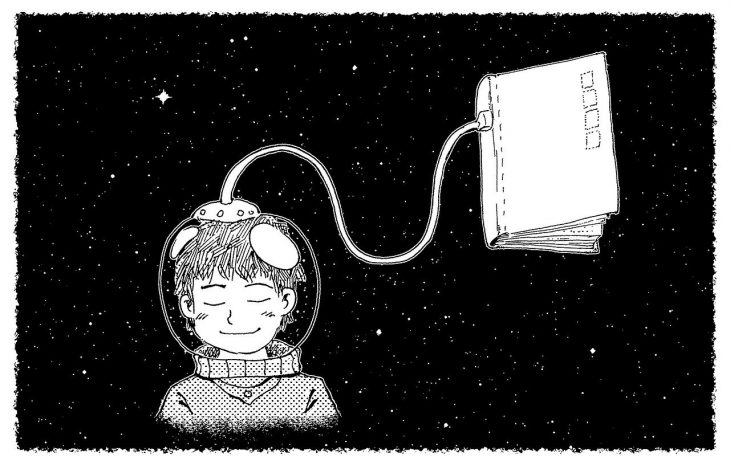
Play, my dears. Play is the point. What fun to toy with meaning and expectation, to weave and weft! To delight in triplets trickling from tickled tongues. To find the fun; to splash in the sun-dappled stream of language and chase the meanings swimming lazily beneath the surface. For language can be such a joy if we let it, if we break free from the tyranny of Brevity for its own sake.
There is no sin in letting the words play. In delighting at their twisting, joyous clamour. To dance with them their strange magical rites.

So many tangled tales have been met with distaste from one, only to be adored by another. Many a phrase has stopped an artist in their tracks, struck by the beauty, only to be scorned by the scholar.
In truth, there is no proper way to present prose. Dance or do not. Play or do not. Let the tyrant Brevity reign over the page, or place him back down into the ranks to work in concert with his fellows, or abandon him altogether. It is all correct. It is all true. It is all right.
But turn not away from the colour purple because some fool said you must. Like Brevity, it has its place and its purpose, even if that purpose is simply to be frivolous, existing for nothing else but the music it makes.
Or maybe even to inflate a word count. Ahem.
Alright, I’m done playing now. Mostly. Though I’ve been terribly tongue-in-cheek with this post, the sentiment is true. I do love reading books where the author has permitted themselves to revel in the language they use; when it’s clear that they’re going not for strict adherence to the rules and order, but to create an image, to paint, to evoke an emotion.
Yes, learn the rules. Of course.
And then smash them to pieces.
Is it possible to mess it up? Yes. Perhaps it doesn’t quite work. But that’s the wonderful thing about words. They’re much like painting in oils. You can massage the colours, work them across the canvas until they form the pleasing shapes you were aiming for. Or simply scrape teh canvas clean and start again. But don’t be so afraid of messing it up that you never attempt to paint at all. Take the time to play with words. Have fun.
Know that there will be a reader who will love your “purple” prose. It will likely be me, since I love how wonderful and musical language can be.
What about you? What writing styles do you like? There are no wrong answers in this case, only differing opinions. And I love hearing them!
When S.M. Carrière isn’t brutally killing your favorite characters, she spends her time teaching martial arts, live streaming video games, and cuddling her cat. In other words, she spends her time teaching others to kill, streaming her digital kills, and a cuddling furry murderer. Her most recent titles include Daughters of Britain, Skylark and Human. Her serial The New Haven Incident is free and goes up every Friday on her blog.
SPFBO Finalist Interview: Rachel Aaron, the author of By A Silver Thread

ABOUT THE AUTHOR: Rachel Aaron lives in Colorado with her family. She has graduated from University of Georgia with a B.A. in English Literature. She has been an avid reader since her childhood and now has an ever-growing collection to show for it. She loves gaming, Manga comics & reality TV police shows. She also posts regularly on her blog about publishing, books and several other intriguing things.
Find Rachel online: website
By a Silver Thread links: Amazon, Goodreads
Thank you for agreeing to this interview. Before we start, tell us a little about yourself.
Absolutely! I’m Rachel Aaron for most of my titles, but I also write Science Fiction under Rachel Bach. I got my start as a writer with my debut Fantasy novel, The Spirit Thief, published by Orbit Books in 2010. It’s a fun, fast paced romp about a wizard thief and it’s still one of my favorite stories I’ve ever written. After eight books with Orbit, I decided to try my hand at self publishing with my cyberpunk/Urban Fantasy mashup novel Nice Dragons Finish Last about dragons in a futuristic magical Detroit. It was an amazing experience and I’ve been self publishing ever since!
Do you have a day job? If so, what is it?
Nope, I’ve been writing full time since 2012. I keep waiting for the day I have to get a real job again, but so far so good!
Who are some of your favorite writers, and why is their work important to you?
If we’re talking about authors that heavily influenced me as a writer, it’s gotta be the books I stole from my mom’s bookshelf. We’re talking Peter S. Beagle, C.S. Lewis, Ursula LeGuin, Elizabeth Moon, Marion Zimmer Bradley, and of course Tolkien. (My mom is a giant LOTR fan). More recently, I’ve absolutely fallen in love with T. Kingfisher and Naomi Novik. Those ladies write some beautiful books!
What do you like most about the act of writing?
The pure joy of creation. I call myself a method actor writer because I get totally swept up in my stories. That feeling of being in a different world where I get to be god is the reason I do this. I’m one of those writers who can’t help but write. Even if no one wanted to read my stuff, I’d still have to write it because I can’t not write. At this point, I’m pretty sure I’m going to be doing this until I die.
Can you lead us through your creative process? What works and doesn’t work for you? How long do you need to finish a book?
You’re not going to like this answer, but it really is different for every story. I’ve written first drafts in as little as 13 days and as long as 16 months. Every story is its own unique world of problems. Sometimes I know exactly what I’m doing and the whole thing comes out right on the first try. Other times I have to keep failing forward until I flop over the finish line by dint of sheer determination. I always make a plan, but no plan survives the first encounter with the enemy, so I just do my best and keep bashing my way forward until the book is good. (It HAS to be good. Rule #1 of publishing: books can be late for six months but they’re bad forever. NEVER put out something you’re not proud of to meet a deadline.)
What made you decide to self-publish By A Silver Thread as opposed to traditional publishing?
It’s kind of mercenary, but the money. I loved working with Orbit Books, but I’ve got a family to support and self publishing pays authors way better than publishing contracts do. I’m also a control freak who loves handling her own business and marketing decisions, so it was a natural fit for me. I also like that I can make my titles cheaper for readers while still earning a decent living. I know I hate paying $13.99 for an ebook, and making sure my books are never in that position is a big part of why I publish independently.
What’s your favorite and least favorite parts of self-publishing?
Favorite: having total control. Least favorite: having total control.
Every screw up is my fault and there’s no one else to do the work. There’s a lot of days when I hate having to wear every hat, but I also love it when I get to pick exactly the right cover I want for the title. It all balances out!
Why did you enter SPFBO?
Because Mihir at Fantasy Book Critic told me to! He’s been reviewing my books since the very beginning. He’s amazing and always knows what’s cool. I’ve never gone wrong taking his advice, and since I’m here in the finals, I’d say his streak has held true. Thank you, Mihir, for encouraging me to enter!!
How would you describe the plot of By A Silver Thread if you had to do so in just one or two sentences?
A fairy changeling must break free of her abusive father figure and use her shapeshifting magic and knowledge of the dangerous fairy courts to save her lost sister in a magical future version of Detroit.
What was your initial inspiration for By A Silver Thread? How long have you been working on it? Has it evolved from its original idea?
I actually came up with Lola’s story long before the DFZ was a thing. I actually wrote the first version of her book back when I was still working on my Orbit titles, but I could never get the story to work and eventually abandoned the project. Then, over a decade later, I was brainstorming up new ideas for the DFZ when I realized I hadn’t written a story about a blood mage yet. The idea was first mentioned by Marci in Nice Dragons Finish Last, but I’d never gotten a chance to do anything with it. Since I’d originally stolen the idea from Victor in that abandoned novel, though, this got me thinking about Lola again and the whole series just snapped together like it was meant to be!
This is why you never throw away old novels. You never know when those words will come back to be useful!
What genre does it belong to?
Definitely Urban Fantasy, but the genre has been so invaded by Paranormal Romance that most people get confused when I tell them I don’t write about werewolves and vampires. It really is an Urban Fantasy, though, because there’s dragons and the city itself is a speaking character.
If you had to describe it in 3 adjectives, which would you choose?
Fast, dark, and fun. I typically write lighter stuff, but you can’t write about abusive blood mages without getting a little dark, so I went where the story took me. It still has a happy ending, though. Real life has too much suffering already to write tragedies.
Is it part of the series or a standalone? If series, how many books have you planned for it?
By a Silver Thread is the first in the DFZ Changeling trilogy, which is a (completed!) stand alone series set in the same city as my Heartstrikers and DFZ books. All the series share a setting and sometimes characters do cameos, but they’re all designed to be read independently in any order.
Who are the key players in this story? Could you introduce us to By A Silver Thread’s protagonists/antagonists?
The heart and soul of By a Silver Thread is Lola, our changeling main character, but the mover and the shaker is Victor, her blood mage master, primary antagonist, and all around nasty customer. Their battle is as much an emotional fight as a literal one, and I had a really fun time writing a downtrodden, underestimated girl finding her power and taking a swing at an arrogant, emotionally abusive asshole. The whole process was very cathartic and I really enjoyed it.
I also loved writing the Black Rider, Lola’s sometimes ally, sometimes enemy. He was a fun pile of problems to tackle.
Does your book feature a magic/magic system? If yes, can you describe it?
I can’t really describe it without spoilers or making this interview 100,000 words long, but I will say that I’m a writer who’s also a gamer. If you value consistent, carefully designed magical systems where even the heroes have to follow the rules and be clever rather than just power-batteling it out, I’m your author!
Have you written the book with a particular audience in mind?
I write every book for myself. I’m always my first customer because I’m the only reader I can totally understand. Fortunately for me, I’m a giant nerd who likes fast-paced, dramatic stories with charming characters, creative twists, and plenty of dragons, which is a great space to write books in!
What’s new or unique about your book that we don’t see much in speculative fiction these days?
Honestly, I’d say genre blending and being unpredictable. With so many books on the market, we’re seeing the rise of a lot of titles that are very firmly in the ruts of their genres. There’s nothing wrong with that--I also love a perfectly executed Epic Fantasy that hits all my favorite topes--but sometimes you find the best experiences off the beaten path.
If you’re looking for a new story with characters and plot twists you haven’t already read a hundred times, that’s where my books shine. Nothing I’ve ever written fits neatly on a shelf. They’re all these crazy genre-blending fusion stories, so if you’re the sort of reader who likes to try new things, I hope you’ll give my stories a go. If nothing else, I promise it’ll be a hell of a ride!
Cover art is always an important factor in book sales. Can you tell us about the idea behind the cover of By A Silver Thread and the artist?
Doing my own covers is one of the best parts of being an indie. I was actually a graphic designer before I became a writer and I’ve always loved art. I spend a lot more than other indies on my cover images precisely because I want them to be art. I want covers that are also paintings because I know I pick up books with amazing covers.
Basically, if my book is going to be judged by its cover, I want to make sure I’m always making the best impression possible, which is why I’ve been working with Luisa Preissler for years. She’s an amazing artist and a consummate professional who’s worked with big publishers for years. She’s also a genuinely lovely person who reads my books, listens to all my harebrained concepts, and turns them into amazing covers. It’s my honor to be part of her portfolio!
What are you currently working on that readers might be interested in learning more about, and when can we expect to see it released?
Right now I’m 3 books into a totally new Urban Fantasy series about demons teaming up with a witch to fight a guerilla war against a very unpleasant Heaven in modern-day Seattle. The first book is Hell for Hire and it’s got the best cover I think Luisa’s made for me yet! It’ll be five books in total with book 3 coming out in March. If you like Urban Fantasy action, sword fights, and wild, inventive magic, you should definitely give it a try!
Thank you for taking the time to answer all the questions. In closing, do you have any parting thoughts or comments you would like to share with our readers?
Just thank you for reading/listening to my work. You’re all the reason I’ve gotten to work the best job in the world for the last fifteen years. It is my honor and pleasure to get to write for you, and I really hope you enjoy the stories!
THE CRIMSON ROAD by A.G. Slatter (Sourdough Universe)
Audiobook Review: Cold as Hell by Kelley Armstrong
I received a review copy from the publisher. This does not affect the contents of my review and all opinions are my own.
 Cold as Hell by Kelley Armstrong
Cold as Hell by Kelley Armstrong
Mogsy’s Rating (Overall): 4.5 of 5 stars
Genre: Mystery, Thriller
Series: Book 3 of Haven’s Rock
Publisher: Macmillan Audio (February 18, 2025)
Length: 10 hrs and 6 mins
Author Information: Website | Twitter
Narrator: Therese Plummer
Kelley Armstrong returns to the remote wilderness of Haven’s Rock in Cold as Hell, the third installment of her new mystery series spun off and set in the same world as her Rockton books. Ever since they helped launch another sanctuary town in the Yukon after the old one fell apart, a lot has happened to Detective Casey Duncan and her husband Sheriff Eric Dalton. Armed with a more holistic vision for their new home, their goals include being a lot more selective in the people they take in, as well as upholding their pledge to keep the existing residents safe.
That said, trouble always seems to have a way of finding Haven’s Rock, as isolated as it is. One night, a woman returning home from the local bar is attacked in the woods by an unidentified assailant, barely managing to escape. A tox screen afterwards also reveals that she had been drugged by a powerful sleeping aid, which presumably was in her spiked drink. Aware that all prescription drugs going in and out of town are strictly controlled, Casey knows this will be the ideal point to begin her investigation. There are only a limited number of suspects, after all.
However, with the harsh winter season upon them, Casey and Dalton know that time is not on their side. Not to mention, they are also expecting the birth of their first child any day now. Far from civilization, it’s clear that one bad storm could wreak havoc on their lives, both professional and private. And sure enough, when a sudden and violent blizzard rolls in, whiteout conditions not only prevent Casey from flying out for obstetrics care, but they also give the unknown culprit a perfect opportunity to claim another victim. This time, he or she is successful, and the body of a woman is found in the forest the next day with signs of forcible abduction and torture. There’s a predator on the loose in Haven’s Rock, and Casey must follow the clues to catch the killer before her due date—or before another life is lost.
Haven’s Rock—and before that, Rockton—is one of my favorite fictional settings, which might not be surprising with my fondness for icy, lonely places in books. Kelley Armstrong has always had a knack for making the Yukon wilds feel immersive for readers, emphasizing both its vastness and seclusion. Despite all the work Casey, Dalton, and their friends have put into setting it up, the town is still in its infancy. Not all rules or safety nets are in place yet, and in some ways, the leadership is making it all up as they go along. When you consider how they are also at the mercy of the elements, uncertainty and instability become villains in their own right, even as our protagonists work to hunt down the literal bad guys.
In terms of characterization, Casey remains an impressive leading woman. We’re up to ten books starring her, and I think it’s safe to say her strength and resourcefulness are pretty well established by now. Still, Cold as Hell features a new role for Casey as expectant mother, and along with that comes all the physical and emotional vulnerabilities being eight to ninth months pregnant. Granted, impending parenthood seems exacerbate the worst and most annoying aspects of our protagonists—for instance, Casey’s lack of self-preservation, or Dalton’s overbearing protectiveness—though to be fair, both seem to acknowledge and own up to them.
Still, the murder mystery plot was perhaps the most surprising. As I’ve noted in my reviews for the previous books, the remote setting is a double-edged sword, on the one hand satisfying the requirement for a locked room mystery, but on the other making it difficult to introduce new characters in subsequent books without making it too obvious who the killer is. Starting over with a new town with new people fixed this somewhat, but as the Haven’s Rock series grows, I was worried we would start running into the same problem again. Thankfully, we haven’t reached this point yet, with Cold as Hell being able to keep readers guessing, even throwing in a couple twists I didn’t see coming. Plus, combining the tensions involved in the investigation with the unpredictability of Casey’s pregnancy simply raised the stakes even higher.
At the end of the day, this was another winner in Kelley Armstrong’s growing collection of mystery thrillers, and another solid novel starring Casey Duncan and Eric Dalton. Ultimately, I don’t know if there will be another installment to the Haven’s Rock series, which is a testament to how satisfied I was with the ending in Cold as Hell, though obviously I would be all for spending more time with these characters. I have to say, this was probably my favorite book since the early Rockton days. As for the audiobook, narrator Therese Plummer once again delivered a splendid performance. If you are looking for gripping mystery with an atmospheric setting, compelling characters, and a touch of survivalist tension, this is a fantastic series to dive into.
![]()
![]()
Free Fiction Monday: The Perfect Man
Paige Racette envisioned the perfect man over and over in her romance novels.
But when Josiah Wells starts using those novels as a blueprint for the way to romance her, she finds the attention creepy, not attractive.
When Wells escalates, adding violence to his role-playing, Paige realizes she must escape the perfect man. But she might find help from someone unexpected—someone a little more flawed, a little less perfect.
“The Perfect Man” is available for one week on this site. The ebook is also available on all retail stores, as well as here.
The Perfect Man By Kristine Kathryn Rusch
Paige Racette stared at herself in the full-length mirror, hands on hips. Golden cap of blond hair expertly curled, narrow chin, high cheekbones, china blue eyes, and a little too much of a figure—thanks to the fact she spent most of her day on her butt and sometimes (usually!) forgetting to exercise. The black cocktail dress with its swirling party skirt hid most of the excess, and the glittering beads around the collar brought attention to her face, always and forever her best asset.
Even with the extra pounds, she was not blind date material. Never had been. Until she quit her day job at the television station, she’d had to turn men away. Ironic that once she became a best-selling romance writer, she couldn’t get a date to save her life. Part of the problem was that after she quit, she moved to San Francisco where she’d always wanted to live. She bought a Queen Anne in an old, exclusive neighborhood, set up her office in the bay windows of the second floor, and decided she was in heaven.
Little did she realize that working at home would isolate her, and being in a new city would isolate her more. It had taken her a year to make friends—mostly women, whom she met at the gym not too far from her home.
She saw interesting men, but didn’t speak to them. She was still a small town girl at heart, one who was afraid of the kind of men who lurked in the big city, who believed that the only way to meet the right man was after getting to know him through mutual interests—or mutual friends.
In fact, she wouldn’t have agreed to this blind date if a friend hadn’t convinced her. Sally Myer was her racquetball partner and general confidant who seemed to know everyone in this city. She’d finally tired of Paige’s complaining and set her up.
Paige slid on her high heels. Who’d ever thought she’d get this desperate? And then she sighed. She wasn’t desperate. She was lonely.
And surely, there was no shame in that.
***
Sally had picked the time and location, and had told Paige to dress up. Sally wasn’t going to introduce them. She felt that would be tacky and make the first meeting uncomfortable. She asked Paige for a photograph to give to the blind date—one Josiah Wells—and then told Paige that he would find her.
The location was an upscale restaurant near the Opera House. It was The Place To Go at the moment—famous chef, famous food, and one of those bars that looked like it had come out of a movie set—large and open where Anyone Who Was Someone could see and be seen.
Paige arrived five minutes early, habitually prompt even when she didn’t want to be. She adjusted the white pashmina shawl she’d wrapped around her bare shoulders and scanned the bar before she went in.
It was all black and chrome, with black tinted mirrors and huge black vases filled with calla lilies separating the booths. The bar itself was black marble and behind it, bottles of liquor pressed against an untinted mirror, making the place look even bigger than it was.
She had only been here once before, with her Hollywood agent and a movie producer who was interested in her second novel. He didn’t buy it—the rights went to another studio for high six figures—but he had bought her some of her most memorable meals in the City by the Bay.
She sat at the bar and ordered a Chardonnay which she didn’t plan on touching—she wanted to keep her wits about her this night. Even with Sally’s recommendation, Paige didn’t trust a man she had never met before. She’d heard too many bad stories.
Of course, all the ones she’d written were about people who saw each other across a crowded room and knew at once that they were soul mates. She had never experienced love at first sight (and sometimes she joked to her editor that it was lust at first sight) but she was still hopeful enough to believe in it.
She took the cool glass of Chardonnay that the bartender handed her and swiveled slightly in her chair so that she would be in profile, not looking anxious, but visible enough to be recognizable. And as she did, she saw a man enter the bar.
He was tall and broad-shouldered, wearing a perfectly tailored black suit that shimmered like silk. He wore a white scarf around his neck—which on him looked like the perfect fashion accent—and a red rose in his lapel. His dark hair was expertly styled away from his chiseled features, and she felt her breath catch.
Lust at first sight. It was all she could do to keep from grinning at herself.
He appeared to be looking for someone. Finally, his gaze settled on her, and he smiled.
Something about that smile didn’t quite fit on his face. It was too personal. And then she shook the feeling away. She didn’t want to be on a blind date—that was all. She had been fantasizing, the way she did when she was thinking of her books, and she was simply caught off guard. No man was as perfect as her heroes. No man could be, not and still be human.
Although this man looked perfect. His rugged features were exactly like ones she had described in her novels.
He crossed the room, the smile remaining, hand extended. “Paige Racette? I’m Josiah Wells.”
His voice was high and a bit nasal. She took his hand, and found the palm warm and moist.
“Nice to meet you,” she said, removing her hand as quickly as possible.
He wore tinted blue contacts, and the swirling lenses made his eyes seem shiny, a little too intense. In fact, everything about him was a little too intense. He leaned too close, and he seemed too eager. Perhaps he was just as nervous as she was.
“I have reservations here if you don’t mind,” he said.
“No, that’s fine.”
He extended his arm—the perfect gentleman—and she took the elbow in her hand, trying to remember the last time a man had done that for her. Her father maybe, when they went to the father-daughter dinner at her church back when she was in high school. And not one man since.
Although all the men in her books did it. When she wrote about it, the gesture seemed to have an old-fashioned elegance. In real life, it made her feel awkward.
He led her through the bar, placing one hand possessively over hers. This exact scene had happened in her first novel, Beneath a Lover’s Moon. Fabian Garret and Skye Michaels had met, exchanged a few words, and were suddenly walking together like lovers. And Skye had thrilled to Fabian’s touch.
Paige wished Josiah Wells’s fingers weren’t so clammy.
He led them to the maître d’, gave his name, and let the maître d’ lead them to a table near the back. See and Be Seen. Apparently they weren’t important enough.
“I asked for a little privacy,” he said, as if reading her thoughts. “I hope you don’t mind.”
She didn’t. She had never liked the display aspect of this restaurant anyway.
The table was in a secluded corner. Two candles burned on silver candlesticks and the table was strewn with miniature carnations. A magnum of champagne cooled in a silver bucket, and she didn’t have to look at the label to know that it was Dom Perignon.
The hair on the back of her neck rose. This was just like another scene in Beneath a Lover’s Moon.
Josiah smiled down at her and she made herself smile at him. Maybe he thought her books were a blueprint to romancing her. She would have said so not five minutes before.
He pulled out her chair, and she sat, letting her shawl drape around her. As Josiah sat across from her, the maître d’ handed her the leather bound menu and she was startled to realize it had no prices on it. A lady’s menu. She hadn’t seen one of those in years. The last time she had eaten here had been lunch, not dinner, and she had remembered the prices on the menu from that meal. They had nearly made her choke on her water.
A waiter poured the champagne and left discretely, just like the maître d’ did. Josiah was watching her, his gaze intense.
She knew she had to say something. She was going to say how nice this was but she couldn’t get the lie through her lips. Instead she said as warmly as she could, “You’ve read my books.”
If anything, his gaze brightened. “I adore your books.”
She made herself smile. She had been hoping he would say no, that Sally had been helping him all along. Instead, the look in his eyes made her want to push her chair even farther from the table. She had seen that look a hundred times at book signings: the too-eager fan who would easily monopolize all of her time at the expense of everyone else in line; the person who believed that his connection with the author—someone he hadn’t met—was so personal that she felt the connection too.
“I didn’t realize that Sally told you I wrote.”
“She didn’t have to. When I found out that she knew you, I asked her for an introduction.”
An introduction at a party would have done nicely, where Paige could smile at him, listen for a polite moment, and then ease away. But Sally hadn’t known Paige that long, and didn’t understand the difficulties a writer sometimes faced. Writers rarely got recognized in person—it wasn’t their faces that were famous after all but their names—but when it happened, it could become as unpleasant as it was for athletes or movie stars.
“She didn’t tell me you were familiar with my work,” Paige said, ducking her head behind the menu.
“I asked her not to. I wanted this to be a surprise.” He was leaning forward, his manicured hand outstretched.
She looked at his fingers, curled against the linen tablecloth, carefully avoiding the miniature carnations, and wondered if his skin was still clammy.
“Since you know what I do,” she continued in that too-polite voice she couldn’t seem to shake, “why don’t you tell me about yourself?”
“Oh,” he said, “there isn’t much to tell.”
And then he proceeded to describe his work with a software company. She only half listened, staring at the menu, wondering if there was an easy—and polite—way to leave this meal, knowing there was not. She would make the best of it, and call Sally the next morning, warning her not to do this ever again.
“Your books,” he was saying, “made me realize that women looked at men the way that men looked at women. I started to exercise and dress appropriately and I…”
She looked over the menu at him, noting the suit again. It must have been silk, and he wore it the way her heroes wore theirs. Right down to the scarf, and the rose in the lapel. The red rose, a symbol of true love from her third novel, Without Your Love.
That shiver ran through her again.
This time he noticed. “Are you all right?”
“Fine,” she lied. “I’m just fine.”
***
Somehow she made it through the meal, feeling her skin crawl as he used phrases from her books, imitated the gestures of her heroes, and presumed an intimacy with her that he didn’t have. She tried to keep the conversation light and impersonal, but it was a battle that she really didn’t win.
Just before the dessert course, she excused herself and went to the ladies room. After she came out, she asked the maître d’ to call her a cab, and then to signal her when it arrived. He smiled knowingly. Apparently he had seen dates end like this all too often.
She took her leave from Josiah just after they finished their coffees, thanking him profusely for a memorable evening. And then she escaped into the night, thankful that she had been careful when making plans. He didn’t have her phone number and address. As she slipped into the cracked backseat of the cab, she promised herself that on the next blind date—if there was another blind date—she would make it drinks only. Not dinner. Never again.
***
The next day, she and Sally met for lattes at an overpriced touristy café on the Wharf. It was their usual spot—a place where they could watch crowds and not be overheard when they decided to gossip.
“How did you meet him?” Paige asked as she adjusted her wrought iron café chair.
“Fundraisers, mostly,” Sally said. She was a petite redhead with freckles that she didn’t try to hide. From a distance, they made her look as if she were still in her twenties. “He was pretty active in local politics for a while.”
“Was?”
She shrugged. “I guess he got too busy. I ran into him in Tower Records a few weeks ago, and we got to talking. That’s what made me think of you.”
“What did?”
Sally smiled. “He was holding one of your books, and I thought, he’s wealthy. You’re wealthy. He was complaining about how isolating his work was and so were you.”
“Isolating? He works for a software company.”
“Worked,” Sally said. “He’s a consultant now, and only when he needs to be. I think he just manages his investments, mostly.”
Paige frowned. Had she heard him wrong then? She wasn’t paying much attention, not after she had seen the carnations and champagne.
Sally was watching her closely. “I take it things didn’t go well.”
“He’s just not my type.”
“Rich? Good-looking? Good God, girl, what is your type?”
Paige smiled. “He’s a fan.”
“So? Wouldn’t that be more appealing?”
Maybe it should have been. Maybe she had over-reacted. She had psyched herself out a number of time about the strange men in the big city. Maybe her overactive imagination—the one that created all the stories that had made her wealthy—had finally betrayed her.
“No,” Paige said. “Actually, it’s less appealing. I sort of feel like he has photos of me naked and has studied them up close.”
“I didn’t think books were that personal. I mean, you write romance. That’s fantasy, right? Make-believe?”
Paige’s smile was thin. It was make-believe. But make-believe on any level had a bit of truth to it, even when little children were creating scenarios with Barbie dolls.
“I just don’t think we were compatible,” Paige said. “I’m sorry.”
Sally shrugged again. “No skin off my nose. You’re the one who doesn’t get out much. Have you ever thought of going to those singles dinners? They’re supposed to be a pretty good place to meet people…”
Paige let the advice slip off her, knowing that she probably wouldn’t discuss her love life—or lack of it—with Sally again. Paige had been right in the first place: she simply didn’t have the right attitude to be a good blind date. There was probably nothing wrong with Josiah Wells. He had certainly gone to a lot of trouble to make sure she had a good time, and she had snuck off as soon as she could.
And if she couldn’t be satisfied with a good-looking wealthy man who was trying to please her, then she wouldn’t be satisfied with any other blind date either. She had to go back to that which she knew worked. She had to go about her life normally, and hope that someday, an interesting guy would cross her path.
“…even go to AA to find dates. I mean, that’s a little crass, don’t you think?”
Paige looked at Sally, and realized she hadn’t heard most of Sally’s monologue. “You know what? Let’s forget about men. It’s a brand-new century and I have a great life. Why do we both seem to think that a man will somehow improve that?”
Sally studied her for a moment. “You know what I think? I think you’ve spent so much time making up the perfect man that no flesh-and-blood guy will measure up.”
And then she changed the subject, just like Paige had asked.
***
As Paige drove home, she found herself wondering if Sally was right. After all, Paige hadn’t dated anyone since she quit her job. And that was when she really spent most of her time immersed in imaginary romance. Her conscious brain knew that the men she made up were too perfect to be real. But did her subconscious? Was that what was preventing her from talking to men she’d seen at the opera or the theater? Was all this big city fear she’d been thinking about simply a way of preventing herself from remembering that men were as human—and as imperfect—as she was?
She almost had herself convinced as she parked her new VW Bug on the hill in front of her house. She set the emergency brake and then got out, grabbing her purse as she did.
She had a lot of work to do, and she had wasted most of the day obsessing about her unsatisfying blind date. It was time to return to work—a romantic suspense novel set on a cruise ship. She had done a mountain of research for the book—including two cruises—one to Hawaii in the winter, and another to Alaska in the summer. The Alaska trip was the one she had decided to use, and she had spent part of the spring in Juneau.
By the time she had reached the front porch, she was already thinking of the next scene she had to write. It was a description of Juneau, a city that was perfect for her purposes because there was only two ways out of it: by air or by sea. The roads ended just outside of town. The mountains hemmed everything in, trapping people, good and bad, hero and villain, within their steep walls.
She was so lost in her imagination that she nearly tripped over the basket sitting on her porch.
She bent down to look at it. Wrapped in colored cellophane, it was nearly as large as she was, and was filled with flowers, chocolates, wine and two crystal wine goblets. In the very center was a photo in a heart-shaped gold frame. She peered at it through the wrapping and then recoiled.
It was a picture of her and Josiah at dinner the night before, looking, from the outside, like a very happy couple.
Obviously he had hired someone to take the picture. Someone who had watched them the entire evening, and waited for the right moment to snap the shot. That was unsettling. And so was the fact that Josiah had found her house. She was unlisted in the phonebook, and on public records, she used her first name—Giacinta—with no middle initial. And although her last name was unusual, there were at least five other Racettes listed. Had Josiah sent a basket to every one of them, hoping that he’d find the right one and she’d call him?
Or had he had her followed?
The thought made her look over her shoulder. Maybe there was someone on the street now, watching her, wondering how she would react to this gift.
She didn’t want to bring it inside, but she felt like she had no choice. She suddenly felt quite exposed on the porch.
She picked up the basket by its beribboned handle and unlocked her door. Then she stepped inside, closed the door as her security firm had instructed her, and punched in her code. Her hands were shaking.
On impulse, she reset the perimeter alarm. She hadn’t done that since she moved in, had thought it a silly precaution.
It didn’t seem that silly any more.
She set the basket on the deacons bench she had near the front door. Then she fumbled through the ribbon to find the card which she knew had to be there.
Her name was on the envelope in calligraphed script, but the message inside was typed on the delivery service’s card.
Two hearts, perfectly meshed.
Two lives, perfectly twined.
Is it luck that we have found each other?
Or does Fate divine a way for perfect matches to meet?
Those were her words. The stilted words of Quinn Ralston, the hero of her sixth novel, a man who finally learned to free the poetry locked in his soul.
“God,” she whispered, so creeped out that her hands felt dirty just from touching the card. She picked up the basket and carried it to the back of the house, setting it in the entryway where she kept her bundled newspapers.
She supposed most women would keep the chocolates, flowers, and wine even if they didn’t like the man who sent them. But she wasn’t most women. And the photograph bothered her more than she could say.
She locked the interior door, then went to the kitchen and scrubbed her hands until they were raw.
***
Somehow she managed to escape to the Juneau of her imagination, working furiously in her upstairs office, getting nearly fifteen pages done before dinner. Uncharacteristically, she closed the drapes, hiding the city view she had paid so much for. She didn’t want anyone looking in.
She was cooking herself a taco salad out of Bite-sized Tostitos and bagged shredded lettuce when the phone rang, startling her. She went to answer it, and then some instinct convinced her not to. Instead, she went to her answering machine and turned up the sound.
“Paige? If you’re there, please pick up. It’s Josiah.” He paused and she held her breath. She hadn’t given him this number. And Sally had said that morning that she hadn’t given Paige’s unlisted number to anyone. “Well, um, you’re probably working and can’t hear this.”
A shiver ran through her. He knew she was home, then? Or was he guessing.
“I just wanted to find out of you got my present. I have tickets to tomorrow night’s presentation of La Bohème. I know how much you love opera and this one in particular. They’re box seats. Hard to get. And perfect, just like you. Call me back.” He rattled off his phone number and then hung up.
She stared at the machine, with its blinking red light. She hadn’t discussed the opera with him. She hadn’t discussed the opera with Sally either, after she found out that Sally hated “all that screeching.” Sally wouldn’t know La Bohème from Don Giovanni, and she certainly wouldn’t remember either well enough to mention to someone else.
Well, maybe Paige’s problem was that she had been polite to him the night before. Maybe she should have left. She’d had this problem in the past—mostly in college. She’d always tried to be polite to men who were interested in her, even if she wasn’t interested in return. But sometimes, politeness merely encouraged them. Sometimes she had to be harsh just to send them away.
Harsh or polite, she really didn’t want to talk to Josiah ever again. She would ignore the call, and hope that he would forget her. Most men understood a lack of response. They knew it for the brush-off it was.
If he managed to run into her, she would just apologize and give him the You’re Very Nice I’m Sure You’ll Meet Someone Special Someday speech. That one worked every time.
Somehow, having a plan calmed her. She finished cooking the beef for her taco salad and took it to the butcher block table in the center of her kitchen. There she opened the latest copy of Publisher’s Weekly and read it while she ate.
***
During the next week, she got fifteen bouquets of flowers, each one an arrangement described in her books. Her plan wasn’t working. She hadn’t run into Josiah, but she didn’t answer his phone calls. He didn’t seem to understand the brush off. He would call two or three times a day to leave messages on her machine, and once an hour, he would call and hang up. Sometimes she found herself standing over the Caller ID box, fists clenched.
All of this made work impossible. When the phone rang, she listened for his voice. When it wasn’t him, she scrambled to pick up, her concentration broken.
In addition to the bouquets, he had taken to sending her cards and writing her long e-mails, sometimes mimicking the language of the men in her novels.
Finally, she called Sally and explained what was going on.
“I’m sorry,” Sally said. “I had no idea he was like this.”
Paige sighed heavily. She was beginning to feel trapped in the house. “You started this. What do you recommend?”
“I don’t know,” Sally said. “I’d offer to call him, but I don’t think he’ll listen to me. This sounds sick.”
“Yeah,” Paige said. “That’s what I’m thinking.”
“Maybe you should go to the police.”
Paige felt cold. The police. If she went to them, it would be an acknowledgement that this had become serious.
“Maybe,” she said, but she hoped she wouldn’t have to.
***
Looking back on it, she realized she might have continued enduring if it weren’t for the incident at the grocery store. She had been leaving the house, always wondering if someone was watching her, and then deciding that she was being just a bit too paranoid. But the fact that Josiah showed up in the grocery store a few moments after she arrived, pushing no grocery cart and dressed exactly like Maximilian D. Lake from Love at 37,000 Feet was no coincidence.
He wore a new brown leather bomber jacket, aviation sunglasses, khakis and a white scarf. When he saw her in the produce aisle, he whipped the sunglasses off with an affected air.
“Paige, darling! I’ve been worried about you.” His eyes were even more intense that she remembered, and this time they were green, just like Maximilian Lake’s.
“Josiah,” she said, amazed at how calm she sounded. Her heart was pounding and her stomach was churning. He had her trapped—her cart was between the tomato and asparagus aisles. Behind her, the water jets, set to mist the produce every five minutes, kicked on.
“You have no idea how concerned I’ve been,” he said, taking a step closer. She backed toward the onions. “When a person lives alone, works alone, and doesn’t answer her phone, well, anything could be wrong.”
Was that a threat? She couldn’t tell. She made herself smile at him. “There’s no need to worry about me. There are people checking on me all the time.”
“Really?” He raised a single eyebrow, something she’d often described in her novels, but never actually seen in person. He probably knew that no one came to her house without an invitation. He seemed to know everything else.
She gripped the handle on her shopping cart firmly. “I’m glad I ran into you. I’ve been wanting to tell you something.”
His face lit up, a look that would have been attractive if it weren’t so needy. “You have?”
She nodded. Now was the time, her best and only chance. She pushed the cart forward just a little, so that he had to move aside. He seemed to think she was doing it to get closer to him. She was doing it so that she’d be able to get away.
“I really appreciate all the trouble you went to for dinner,” she said. “It was one of the most memorable—”
“Our entire life could be like that,” he said quickly. “An adventure every day, just like your books.”
She had to concentrate to keep that smile on her face. “Writers write about adventure, Josiah, because we really don’t want to go out and experience it ourselves.”
He laughed. It sounded forced. “I’m sure Papa Hemingway is spinning in his grave. You are such a kidder, Paige.”
“I’m not kidding,” she said. “You’re a very nice man, Josiah, but—”
“A nice man?” He took a step toward her, his face suddenly red. “A nice man? The only men who get described that way in your books are the losers, the ones the heroine wants to let down easy.”
She let the words hang between them for a moment. And then she said, “I’m sorry.”
He stared at her as if she had hit him. She pushed the cart passed him, resisting the impulse to run. She was rounding the corner into the meat aisle when she heard him say, “You bitch!”
Her hands started trembling then, and she couldn’t read her list. But she had to. He wouldn’t run her out of here. Then he’d realize just how scared she was.
He was coming up behind her. “You can’t do this, Paige. You know how good we are together. You know.”
She turned around, leaned against her cart and prayed silently for strength. “Josiah, we had one date, and it wasn’t very good. Now please, leave me alone.”
A store employee was watching from the corner of the aisle. The butcher had looked up through the window in the back.
Josiah grabbed her wrist so hard that she could feel his fingers digging into her skin. “I’ll make you remember. I’ll make you—”
“Are you all right, miss?” The store employee had stepped to her side.
“No,” she said. “He’s hurting me.”
“This is none of your business,” Josiah said. “She’s my girlfriend.”
“I don’t know him,” Paige said.
The employee had taken Josiah’s arm. Other employees were coming from various parts of the store. He must have given them a signal. Some of the customers were gathering too.
“Sir, we’re going to have to ask you to leave,” the employee said.
“You have no right.”
“We have every right, sir,” the employee said. “Now let the lady go.”
Josiah stared at him for a moment, then at the other customers. Store security had joined them.
“Paige,” Josiah said, “tell them how much you love me. Tell them that we were meant to be together.”
“I don’t know you,” she said, and this time her words seemed to get through. He let go of her arm and allowed the employee to pull him away.
She collapsed against her cart in relief, and the store manager, a middle-aged man with a nice face, asked her if she needed to sit down. She nodded. He led her to the back of the store, past the cans that were being recycled and the gray refrigeration units to a tiny office filled with red signs about customer service.
“I’m sorry,” she said. “I’m so sorry.”
“Why?” The manager pulled over a metal folding chair and helped her into it. Then he sat behind the desk. “It seemed like he was harassing you. Who is he?”
“I don’t really know.” She was still shaking. “A friend set us up on a blind date, and he hasn’t left me alone since.”
“Some friend,” the manager said. His phone beeped, and he answered it. He spoke for a moment, his words soft. She didn’t listen. She was staring at her wrist. Josiah’s fingers had left marks.
Then the manager hung up. “He’s gone. Our man took his license number and he’s been forbidden to come into the store again. That’s all we can do.”
“Thank you,” she said.
The manager frowned. He was looking at her bruised wrist as well. “You know guys like him don’t back down.”
“I’m beginning to realize that,” she said.
***
And that was how she found herself parking her grocery-stuffed car in front of the local precinct. It was a gray cinderblock building built in the late 1960s with reinforced windows and a steel door. Somehow it did not inspire confidence.
She went inside anyway. The front hallway was narrow, and obviously redesigned. A steel door stood to her right and to her left was a window made of bullet-proof glass. Behind it sat a man in a police uniform.
She stepped up to the window. He finished typing something into a computer before speaking to her. “What?”
“I’d like to file a complaint.”
“I’ll buzz you in. Take the second door to your right. Someone there’ll help you.”
“Thanks,” she said, but her voice was lost in the electronic buzz that filled the narrow hallway. She opened the door and found herself in the original corridor, filled with blond wood and doors with windows. Very sixties, very unsafe. She shook her head slightly, opened the second door, and stepped inside.
She entered a large room filled with desks. It smelled of burned coffee and mold. Most of the desks were empty, although on most of them, the desk lamps were on, revealing piles of papers and files. Black phones as old as the building sat on each desk, and she was startled to see that typewriters outnumbered computers.
There were only a handful of people in the room, most of them bent over their files, looking frustrated. A man with salt and pepper hair was carrying a cup of coffee back to his desk. He didn’t look like any sort of police detective she’d imagined. He was squarely built and seemed rather ordinary.
When he saw her, he said, “Help you?”
“I want to file a complaint.”
“Come with me.” His deep voice was cracked and hoarse, as if he had been shouting all day.
He led her to a small desk in the center of the room. Most of the desks were pushed together facing each other, but this one stood alone. And it had a computer, screen showing the SFPD logo.
“I’m Detective Conover. How can I help you, Miss…?”
“Paige Racette.” Her voice sounded small in the large room.
He kicked a scarred wooden chair toward her. “What’s your complaint?”
She sat down slowly, her heart pounding. “I’m being harassed.”
“Harassed?”
“Stalked.”
He looked at her straight on, then, and she thought she saw a world-weariness in his brown eyes. His entire face was rumpled, like a coat that had been balled up and left in the bottom of a closet. It wasn’t a handsome face by any definition, but it had a comfortable quality, a trustworthy quality, that was built into the lines.
“Tell me about it,” he said.
So she did. She started with the blind date, talked about how strange Josiah was, and how he wouldn’t leave her alone.
“And he was taking things out of my novels like I would appreciate it. It really upset me.”
“Novels?” It was the first time Conover had interrupted her.
She nodded. “I write romances.”
“And are you published?”
The question startled her. Usually when she mentioned her name people recognized it. They always recognized it after she said she wrote romances.
“Yes,” she said.
“So you were hoisted on your own petard, aren’t you?”
“Excuse me?”
“You write about your sexual fantasies for a living, and then complain when someone is trying to take you up on it.” He said that so deadpan, so seriously, that for a moment, she couldn’t breathe.
“It’s not like that,” she said.
“Oh? It’s advertising, lady.”
She was shaking again. She had known this was a bad idea. Why would she expect sympathy from the police? “So since Donald Westlake writes about thieves, he shouldn’t complain if he gets robbed? Or Stephen King shouldn’t be upset if someone breaks his ankle with a sledgehammer?”
“Touchy,” the detective said, but she noticed a twinkle in his eye that hadn’t been there before.
She actually counted to ten, silently, before responding. She hadn’t done that since she was a little girl. Then she said, as calmly as she could, “You baited me on purpose.”
He grinned—and it smoothed out the care lines in his face, enhancing the twinkle in his eye and, for a moment, making him breathlessly attractive.
“There are a lot of celebrities in this town, Ms. Racette. It’s hard for the lesser ones to get noticed. Sometimes they’ll stage some sort of crime for publicity’s sake. And really, what would be better than a romance writer being romanced by a fan who was using the structure of her books to do it?”
She wasn’t sure what she objected to the most, being called a minor celebrity, being branded as a publicity hound, or finding this outrageous man attractive, even for a moment.
“I don’t like attention,” she said slowly. “If I liked attention, I would have chosen a different career. I hate book signings and television interviews, and I certainly don’t want a word of this mess breathed to the press.”
“So far so good,” he said. She couldn’t tell if he believed her, still. But she was amusing him. And that really pissed her off.
She held up her wrist. “He did this.”
The smile left Conover’s face. He took her hand gently in his own and extended it, examining the bruises as if they were clues. “When?”
“About an hour ago. At San Francisco Produce.” She flushed saying the name of the grocery store. It was upscale and trendy, precisely the place a “celebrity” would shop.
But Conover didn’t seem to notice. “You didn’t tell me about the attack.”
“I was getting to it when you interrupted me,” she said. “I’ve been getting calls from him—a dozen or more a day. Flowers, presents, letters and e-mails. I’m unlisted and I never gave him my phone number or my address. I have a private e-mail address, not the one my publisher hands out, and that’s the one he’s using. And then he followed me to the grocery store and got angry when the store security asked him to leave.”
Conover eased her hand onto his desk, then leaned back in his chair. His touch had been gentle, and she missed it.
“You had a date with him—”
“A blind date. We met at the restaurant, and a friend handled the details. And no, she didn’t give him the information either.”
“—so,” Conover said, as if she hadn’t spoken, “I assume you know his name.”
“Josiah Wells.”
Conover wrote it down. Then he sighed. It looked like he was gathering himself. “You have a stalker, Ms. Racette.”
“I know.”
“And while stalking is illegal under California law, the law is damned inadequate. I’ll get the video camera tape from the store, and if it backs you up, I’ll arrest Wells. You’ll be willing to press charges?”
“Yes,” she said.
“That’s a start.” Conover’s world-weary eyes met hers. “but I have to be honest. Usually these guys get out on bail. You’ll need a lawyer to get an injunction against him, and your guy will probably ignore it. Even if he gets sent up for a few years, he’ll come back and haunt you. They always do.”
Her shaking started again. “So what can I do?”
“Your job isn’t tied to the community. You can move.”
Move? She felt cold. “I have a house.” A life. This was her dream city. “I don’t want to move.”
“No one does, but it’s usually the only thing that works.”
“I don’t want to run away,” she said. “If I do that, then he’ll be controlling my life. I’d be giving in. I’d be a victim.”
Conover stared at her for a long moment. “Tell you what. I’ll build the strongest case I can. That might give you a few years. By then, you might be willing to go somewhere new.”
She nodded, stood. “I’ll bring everything in tomorrow.”
“I’d like to pick it up, if you don’t mind. See where he left it, whether he’s got a hidey hole near the house. How about I come to you in a couple of hours?”
“Okay,” she said.
“You got a peephole?”
“Yeah.”
“Use it. I’ll knock.”
She nodded. Then felt her shoulders relax slightly, more than they had for two weeks. Finally, she had an ally. It meant more to her than she had realized it would. “Thanks.”
“Don’t thank me yet,” he said. “Let’s wait until this is all over.”
All over. She tried to concentrate on the words and not the tone. Because Detective Conover really didn’t sound all that optimistic.
***
The biggest bouquet waited for her on the front porch. She could see it from the street, and any hope that the meeting with Conover aroused disappeared. She knew without getting out of the car what the bouquet would be: calla lilies, tiger lilies and Easter lilies, mixed with greens and lilies of the valley. It was a bouquet Marybeth Campbell was designing the day she met Robert Newman in All My Kisses, a bouquet he said was both romantic and sad. (Not to mention expensive: the flowers weren’t in season at the same time.)
She left the bouquet on the porch without reading the card. Conover would be there soon and he could take the whole mess away. She certainly didn’t want to look at it.
After all this, she wasn’t sure she ever wanted to see flowers again.
When she got inside, she found twenty-three messages on her machine, all from Josiah, all apologies, although they got angrier and angrier as she didn’t answer. He must have thought she had come straight home. What a surprise he would have when he realized that she had gone to the police.
She rubbed her wrist, noting the soreness and cursing him under her breath. In addition to the bruises, her wrist was slightly swollen and she wondered if he hadn’t managed to sprain it. Just her luck. He would damage her arm, which she needed to write. She got an ice pack out of the freezer and applied it, sitting at the kitchen table and staring at nothing.
Move. Give up, give in, all because she was feeling lonely and wanted to go on a date. All because she wanted a little flattery, a nice evening, to meet someone safe who could be—if nothing else—a friend.
How big a mistake had that been?
Big enough, she was beginning to realize, to cost her everything she held dear.
***
That night, after dinner, she baked herself a chocolate cake and covered it with marshmallow frosting. It was her grandmother’s recipe—comfort food that Paige normally never allowed herself. This time, though, she would eat the whole thing and not worry about calories or how bad it looked. Who would know?
She made some coffee and was sitting down to a large piece, when someone knocked on her door.
She got up and walked to the door, feeling oddly vulnerable. If it was Josiah, he would only be a piece of wood away from her. That was too close. It was all too close now.
She peered through the peephole, just like she promised Conover she would, and she let out a small sigh of relief. He was shifting from foot to foot, looking down at the bouquet she had forgotten she had left there.
She deactivated the security system, then unlocked the three deadbolts and the chain lock she had installed since this nightmare began. Conover shoved the bouquet forward with his foot.
“Looks like your friend left another calling card.”
“He’s not my friend,” she said softly, peering over Conover’s shoulder. “And he left more than that.”
Conover’s glance was worried. What did he imagine?
“Phone calls,” she said. “Almost two dozen. I haven’t checked my e-mail.”
“This guy’s farther along than I thought.” Conover pushed the bouquet all the way inside with his foot, then closed the door, and locked it. As he did, she reset the perimeter alarm.
Conover slipped on a pair of gloves and picked up the bouquet.
“You could have done that outside,” she said.
“Didn’t want to give him the satisfaction,” Conover said. “He has to know we don’t respect what he’s doing. Where can I look at this?”
“Kitchen,” she said, pointing the way.
He started toward it, then stopped, sniffing. “What smells so good?”
“Chocolate cake. You want some?”
“I thought you wrote.”
“Doesn’t stop me from baking on occasion.”
He glanced at her, his dark eyes quizzical. “This hardly seems the time to be baking.”
She shrugged. “I could drink instead.”
To her surprise, he laughed. “Yes, I guess you could.”
He carried the bouquet into the kitchen and set it on a chair. Then he dug through the flowers to find the card.
It was a different picture of their date. The photograph looked professional, almost artistic, done in black and white, using the light from the candles to illuminate her face. At first glance, she seemed entranced with Josiah. But when she looked closely, she could see the discomfort on her face.
“You didn’t like him much,” Conover said.
“He was creepy from the start, but in subtle hard-to-explain ways.”
“Why didn’t you leave?”
“I was raised to be polite. I had no idea he was crazy.”
Conover grunted at that. He opened the card. The handwriting inside was the same as all the others.
My future and your future are the same. You are my heart and soul. Without you, I am nothing.
—Josiah
She closed her eyes, felt that fluttery fear rise in her again. “There’ll be a ring somewhere in that bouquet.”
“How do you know?” Conover asked.
She opened her eyes. “Go look at the last page of All My Kisses. Robert sends a forgive-me bouquet and in it, he puts a diamond engagement ring.”
“This bouquet?”
“No. Josiah already used that one. I guess he thought this one is more spectacular.”
Conover dug, and then whistled. There, among the stems, was a black velvet ring box. He opened it. A large diamond glittered against a circle of sapphires in a white gold setting.
“Jesus,” he said. “I could retire on this thing.”
“I always thought that was a gaudy ring,” Paige said, her voice shaking. “But it fit the characters.”
“Not to your taste?”
“No.” She sighed and sank back into her chair. “Just because I write about it doesn’t mean I want it to happen to me.”
“I think you made that clear in the precinct today.” He put the ring box back where he found it, returned the card to its envelope and set the flowers on the floor. “Mind if I have some of that cake?”
“Oh, I’m sorry.” She got up and cut him a piece of cake, then poured some coffee.
When she turned around, he was grinning.
“What did I do?” she asked.
“You weren’t kidding about polite,” he said. “I didn’t come here for a tea party, and you could have said no.”
She froze in place. “Was this another of your tests? To see if I was really that polite?”
“I wish I were that smart.” He took the plate from her hand. “I was getting knocked out by the smell. My mother used to make this cake. It always was my favorite.”
“With marshmallow frosting?”
“And that spritz of melted chocolate on top, just like you have here.” He set the plate down and took the coffee from her hand. “Although in those days, I would have preferred a large glass of milk.”
“I have some—”
“Sit.” If anything, his grin had gotten bigger. “Forgive me for being so blunt, but what the hell did you need with a blind date?”
There was admiration in his eyes—real admiration, not the sick kind she’d seen from Josiah. She used her fork to cut a bite of cake. “I was lonely. I don’t get out much, and I thought, what could it hurt?”
He shook his head. That weary look had returned to his face. She liked its rumpled quality, the way that he seemed to be able to take the weight of the world onto himself and still stand up. “What a way to get disillusioned.”
“Because I’m a romance writer?”
“Because you’re a person.”
They ate the cake in silence after that, then he gripped his coffee mug and leaned back in the chair.
“Thanks,” he said. “I’d forgotten that little taste of childhood.”
“There’s more.”
“Maybe later.” And there was no smile on his face any more, no enjoyment. “I have to tell you a few things.”
She pushed her own plate away.
“I looked up Josiah Wells. He’s got a sheet.”
She grabbed her own coffee cup. It was warm and comforting. “Let me guess. The political conferences he stopped going to.”
Conover frowned at her. “What conferences?”
“Here in San Francisco. He was active in local politics. That’s how my friend Sally met him.”
“And he stopped?”
“Rather suddenly. I thought, after all this started, that maybe—”
“I’ll check into it,” Conover said with a determination she hadn’t heard from him before. “His sheet’s from San Diego.”
“I thought he was from here.”
Conover shook his head. “He’s not a dot-com millionaire. He made his money on a software system back in the early nineties, before everyone was into this business. Sold his interest for 30 million dollars and some stock, which has since risen in value. About ten times what it was.”
Her mouth had gone dry. Josiah Wells had lied to both her and Sally. “Somehow I suspect this is important.”
“Yeah.” Conover took a sip of coffee. “He stalked a woman in San Diego.”
“Oh, God.” The news gave her a little too much relief. She had been feeling alone. But she didn’t want anyone else to be experiencing the same thing she was.
“He killed her.”
“What?” Paige froze.
“When she resisted him, he shot her and killed her.” Conover’s soft gaze was on her now, measuring. All her relief had vanished. She was suddenly more terrified than she had ever been.
“You know it was him?”
“I read the file. They faxed it to me this afternoon. All of it. They had him one hundred percent. DNA matches, semen matches—”
She winced, knowing what that meant.
“—the fibers from his home on her clothing, and a list of stalking complaints and injunctions that went on for pages.”
The cake sat like a lump in her stomach. “Then why isn’t he in prison?”
“Money,” Conover said. “His attorneys so out-classed the DA’s office that by the end of the trial, they could have convinced the jury that the judge had done it.”
“Oh, my god,” Paige said.
“The same things that happened to you happened to her,” Conover said. “Only with her those things took about two years. With you it’s taking two weeks.”
“Because he feels like he knows me from my books?”
Conover shook his head. “She was a TV business reporter who had done an interview with him. He would have felt like he knew her too.”
“What then?” Somehow having the answer to all of that would make her feel better—or maybe she was just lying to herself.
“These guys are like alcoholics. If you take a guy through AA, and keep him sober for a year, then give him a drink, he won’t rebuild his drinking career from scratch. He’ll start at precisely the point he left off.”
She had to swallow hard to keep the cake down. “You think she wasn’t the only one.”
“Yeah. I suspect if we look hard enough, we’ll find a trail of women, each representing a point in the escalation of his sickness.”
“You can arrest him, right?”
“Yes.” Conover spoke softly. “But only on what he’s done. Not on what he might do. And I don’t think we’ll be any more successful at holding him than the San Diego DA.”
Paige ran her hand over the butcher block table. “I have to leave, don’t I?”
“Yeah.” Conover’s voice got even softer. He put a hand on hers. She looked at him. It wasn’t world-weariness in his eyes. It was sadness. Sadness from all the things he’d seen, all the things he couldn’t change.
“I’m from a small town,” she said. “I don’t want to bring him there.”
“Is there anywhere else you can go? Somewhere he wouldn’t think of?”
“New York,” she said. “I have friends I can stay with for a few weeks.”
“This’ll take longer than a few weeks. You might not be able to come back.”
“I know. But that’ll give me time to find a place to live.” Her voice broke on that last. This had been her dream city, her dream home. How quickly that vanished.
“I’m sorry,” he said.
“Yeah,” she said quietly. “Me, too.”
***
He decided to stay without her asking him. He said he wanted to sift through the evidence, listen to the phone messages, and read the e-mail. She printed off all of it while she bought plane tickets on-line. Then she e-mailed her agent and told her that she was coming to the City.
Already she was talking like the New Yorker she was going to be.
Her flight left at 8 a.m. She spent half the night packing and unpacking, uncertain about what she would need, what she should leave behind. The only thing she was certain about was that she would need her laptop, and she spent an hour loading her files onto it. She was writing down the names of some moving and packing services when Conover stopped her.
“We leave everything as is,” he said. “We don’t want him to get too suspicious too soon.”
“Why don’t you arrest him now?” she asked. “Don’t you have enough?”
Something flashed across his face, so quickly she almost didn’t catch it.
“What?” she asked. “What is it?”
He closed his eyes. If anything, that made his face look even more rumpled. “I issued a warrant for his arrest before I came here. We haven’t found him yet.”
“Oh, God.” Paige slipped into her favorite chair. One of many things she would have to leave behind, one of many things she might never see again because of Josiah Wells.
“We have people watching his house, watching yours, and a few other places he’s known to hang out,” Conover said. “We’ll get him soon enough.”
She nodded, trying to look reassured, even though she wasn’t.
***
About 3 a.m., Conover looked at her suitcases sitting in the middle of the dining room floor. “I’ll have to ship those to you. No sense tipping him off if he’s watching this place.”
“I thought you said—”
“I did. But we need to be careful. One duffel. The rest can wait.”
“My laptop,” she said. “I need that too.”
He sighed. “All right. The laptop and the biggest purse you have. Nothing more.”
A few hours earlier, she might have argued with him. But a few hours earlier, she hadn’t yet gone numb.
“I need some sleep,” she said.
“I’ll wake you,” he said, “when it’s time to go.”
***
He drove her to the airport in his car. It was an old bathtub Porsche—with the early seventies bucket seats that were nearly impossible to get into.
“She’s not pretty any more,” he said as he tucked Paige’s laptop behind the seat, “but she can move.”
They left at 5, not so much as to miss traffic, but hoping that Wells wouldn’t be paying attention at that hour. Conover also kept checking his rearview mirror, and a few times he executed some odd maneuvers.
“We being followed?” she asked finally.
“I don’t think so,” he said. “But I’m being cautious.”
His words hung between them. She watched the scenery go by, houses after houses after houses filled with people who went about their ordinary lives, not worrying about stalkers or death or losing everything.
“This isn’t normal for you, is it?” she asked after a moment.
“Being cautious?” he said. “Of course it is.”
“No.” Paige spoke softly. “Taking care of someone like this.”
He seemed even more intent on the road than he had been. “All cases are different.”
“Really?”
He turned to her, opened his mouth, and then closed it again, sighing. “Josiah Wells is a predator.”
“I know,” she said.
“We have to do what we can to catch him.” His tone was odd. She frowned. Was that an apology for something she didn’t understand? Or an explanation for his attentiveness?
Maybe it was both.
He turned onto the road leading to San Francisco International Airport. The traffic seemed even thicker here, through all the construction and the dust. It seemed like they were constantly remodeling the place. Somehow he made it through the confusing signs to Short Term Parking. He found a space, parked, and then grabbed her laptop from the back.
“You’re coming in?” she asked.
“I want to see you get on that plane.” He seemed oddly determined.
“Don’t you trust me?”
“Of course I do,” he said and got out of the car.
San Francisco International Airport was an old airport, built right on the bay. The airport had been trying to modernize for years. The new parts were grafted on like artificial limbs.
Paige took a deep breath, grabbed her stuffed oversized purse, and let Conover lead her inside. She supposed they looked like any couple as they went through the automatic doors, stopping to examine the signs above them pointing to the proper airline. Conover was watching the other passengers. Paige was checking out the lines.
She had bought herself a first class ticket—spending more money than she had spent for her very first car. But she was leaving everything behind. The last thing she wanted was to be crammed into couch next to a howling baby and an underpaid, stressed businessman.
She hurried to the first class line, relieved that it was short. Conover stayed beside her, frowning as he watched the people flow past. He seemed both disappointed and alert. He was expecting something. But what?
Paige stepped to the ticket counter, gave her name, showed her identification, answered the silly security questions, and got her E-ticket with the gate number written on the front.
“You’ve got an hour and a half,” Conover said as she left the ticket counter. “Let’s get breakfast.”
His hand rested possessively on her elbow, and he pulled her close as he spoke. She glanced at him, but he still wasn’t watching her.
“I have to make a stop first,” she said.
He nodded.
They walked past the arrival and departure monitors, past the newspaper vending machines and toward the nearest restrooms. This part of the San Francisco airport still had a seventies security design. Instead of a bank of x-ray machines and metal detectors blocking entry into the main part of the terminal, there was nothing. The security measures were in front of each gate: you couldn’t enter without going past a security checkpoint. So different from New York, where you couldn’t even walk into some areas without a ticket. Conover would have no trouble remaining beside her until it was time for her to take off.
She went into the ladies room, leaving Conover near the departure monitors outside. The line was long—several flights had just arrived—but Paige didn’t mind. This was the first time she had a moment to herself since Conover had arrived the night before.
It seemed like weeks ago.
She was going to be sorry to say good-bye to him at the gate. In that short period of time, she had come to rely on him more than she wanted to admit. He made her feel safe for the first time since she had met Josiah Wells.
As she exited the ladies room, a hand grabbed her arm and pulled her sideways. She felt something poke against her back.
“Think you could leave me?”
Wells. She shook her arm, trying to get away, but he clamped harder.
“Scream,” he said, “and I will hurt you.”
“You can’t hurt me,” she said. “You can’t have weapons in an airport.”
“You can bring a gun into an airport,” he said softly, right in her ear. “You just can’t take it through security.”
She felt cold then. He was as crazy as Conover said, then. And as dangerous.
“Josiah.” She spoke loudly, hoping that Conover could hear her. She didn’t see him anywhere. “I’m going to New York on business. When I come back, we can start planning the wedding.”
Wells was silent for a moment. He didn’t move at all. She couldn’t see his face, but she could feel his body go rigid. “You’re playing with me.”
“No,” she said, letting her voice work for her, hoping it sounded convincing. She kept scanning the crowd, but Conover was gone. “I got your ring last night. I decided I needed to settle a few things in New York before I told you I’d say yes.”
Wells put his chin on her shoulder. His breath blew against her hair. “You’re not wearing the ring.”
“It didn’t fit.” she said. “But I have it with me. I was going to have it sized in New York.”
“Let me see it,” he said.
“You’ll have to let me dig into my purse.”
She wasn’t sure he’d believe her. Then, after a moment, he let her go. She brought up her purse, pretended to rummage through it, and took a step toward the ladies room door, praying her plan would work.
He was frowning. He looked like any other businessman in the airport, his suit neat and well-tailored, his trench coat long and expensive, marred only by the way he held his hand in the pocket.
She waited just a split second, until there were a lot of people around from another arriving plane, and then she screamed, “He’s got a gun!” and ran toward the ladies room.
Only she didn’t make it. She was tackled from behind, and went sprawling across the faded carpet. A gunshot echoed around her, and people started screaming, running. The body on top of hers prevented her from moving, and for a moment, she thought whoever had hit her had been shot.
Then she felt arms around her, dragging her toward the departure monitors.
“You little fool,” Conover said in her ear. “I had this under control.”
He pushed her against the base of the monitor, then turned around. Half the people around Wells had remained, and two of them had him in their grasp, while another was handcuffing him. Plainclothes airport police officers. More airport police were hurrying to the spot from the front door.
Passengers were still screaming and running out of the airport. Airline personnel were crouched behind their desks. Paige looked to see whether anyone was shot, but she didn’t see anyone lying injured anywhere.
Her breathing was shallow, and she suddenly realized how terrified she had been. “What do you mean, under control? This doesn’t look under control to me.”
Security had Wells against the wall and were searching him for more weapons. One of the uniformed airport police had pulled Wells’ head back and was yelling at him. Some of the passengers, realizing the threat was over, were drifting back toward the action.
Conover kept one hand on her, holding her in place. With the other, he pulled out his cell phone. He hit the speed-dial and put the small phone against his ear.
“Wait a minute!” Paige said.
He turned away slightly, as if he didn’t want to speak to her. Then he said into the phone, “Frank, do me a favor. Call the news media—everyone you can think of. Tell them something just happened at the airport…. No. I’m not going through official channels. That’s why I called you. Keep my name out of it and get them here.”
He hung up and glanced at Paige. She had never felt so many emotions in her life. Anger, adrenaline, confusion. Then she saw security lead Wells away.
Conover took her arm and helped her up. “What’s going on?” she asked again.
“Outside,” he said, and pushed her through the crowd. After a moment, she remembered to check for her laptop. He had it, and somehow she had retained her purse. They reached the front sidewalk only to find it a confusion of milling people—some still terrified from the shots, others just arriving and trying to drop off their luggage. Cabs honked and nearly missed each other. Buses were backing up as the crowd spilled into the street.
“Oh, this is so much better,” she said.
He moved her down the sidewalk toward another terminal. The crowd thinned here.
“What the hell was that?” she asked. “Where were you? How did he get past you?”
“He didn’t get past me,” Conover said softly.
She felt the blood leave her face. “You set me up? I was bait?”
“It wasn’t supposed to happen like this.”
“Oh, really? He was supposed to drag me onto the nearest flight? Or shoot me?”
“I didn’t know he had a gun,” Conover said. “He was ballsier than I expected. And he wouldn’t have taken you from San Francisco.”
“You know this how? Because you’re psychic?”
“No, he wanted to control you. He couldn’t control you on a plane. I had security waiting outside. A few plainclothes had been around us since we arrived. He was supposed to grab you, but you weren’t supposed to try to get away.”
“Nice if you would have told me that.”
He shook his head slightly. “Most people wouldn’t have fought him. Most people would have cooperated.”
“Most people would have appreciated an explanation!” Her voice rose and a few stray passengers looked her direction. She made herself take a deep breath before she went on. “You knew he was going to be here. You knew it and didn’t tell me.”
“I guessed,” he said.
“What did you do, tip him off?”
“No,” Conover said softly. “You did.”
“I did? I didn’t talk to him.”
“You booked your e-ticket on-line.” His face was close to hers, his voice as soft as possible in all the noise. “He’d hacked into your system weeks ago. That’s how he found your address and your phone number. Your public e-mail comes into the same computer as all your other e-mail. He’s been following your every move ever since.”
“Software genius,” she muttered, shaking her head. She should have seen that.
Conover nodded. Across the way, reporters started converging on the building, cameras hefted on shoulders, running toward the doors. Conover shielded her, but she knew they would want to talk to her.
“Why didn’t you warn me?” she asked again.
“I thought you’d be too obvious then, and he wouldn’t try for you. I didn’t expect you to be so cool under pressure. Telling him about the ring, pretending you were interested, was smart.”
One of the reporters was working the crowd. People were turning toward the camera.
“Where were you?” she asked. “I looked for you.”
“I was behind you all the time.”
“So if he took me outside…?”
“I would have followed.”
“I don’t understand. Why didn’t you tell me not to get the ticket on line?”
“The ticket was a gift,” Conover said. “I didn’t realize you were going to do it that way. You told me when you finished. His file from the previous case mentioned how he had used the internet to spy on his first victim. He was obviously doing that with you.”
“But the airport, how did they know?”
“I called ahead, said that I was coming in, expecting a difficult passenger. I faxed his photo from your place while you were asleep. I asked them to wait until I got him outside, unless he did something threatening.”
She frowned. More reporters were approaching. These looked like print media. No cameras, but lots of determination. “You could have waited and caught him at home.”
“I could have,” Conover said. “But this is better.”
She turned to him, remembering the feel of the gun against her back, the screaming passengers, the explosive sound when the gun went off. “Someone could have been killed.”
“I didn’t expect a gun,” Conover said. “And I didn’t think he’d be rash enough to use it in an airport.”
“But he did,” she said.
“And it’s going to help us.” Conover watched another set of reporters run into the building. “First, his assault on you in an airport makes it a federal case. The gun adds to the case, and all the witnesses make it even better. Then there is the fact that airports are filled with security cameras. There’s bound to be tape on this.”
She frowned, trying to take herself out of this, trying to listen like a writer instead of a potential victim.
“And then,” Conover said, “he attacked you. You’re nationally known. It’ll be big news. Our DA might have lost a stalking case against Wells, but the feds aren’t going to let a guy who went nuts in an airport walk, no matter how much money he has.”
“You set him up,” she said. “If this had failed—”
“At the very least, I would have been fired,” Conover said. “But it wouldn’t have failed. I wouldn’t have let anything happen to you. I didn’t let anything happen to you.”
“But you took such a risk.” She raised her head toward his. “Why?”
He put a finger under her chin, and for a moment, she thought he was going to kiss her.
“Because you didn’t want to leave San Francisco,” he said softly.
“I get to stay home?” she asked.
He smiled, and let his finger drop. “Yeah.”
He stared at her uncertainly, as if he were afraid she was going to yell at him again. But she felt a relief so powerful that it completely overwhelmed her.
She threw her arms around him. For a moment, he didn’t move. Then, slowly, his arms wrapped around her and pulled her close.
“I don’t even know your first name,” she whispered.
“Pete,” he said, burying his face in her hair.
“Pete.” She tested it. “It suits you.”
“I’d ask if I could call you,” he said, “but I’m not real good on dates.”
That pulled a reluctant laugh from her. “Obviously I’m not either. But I make a mean chocolate cake.”
“That’s right,” he said. “Let’s go finish it.”
“Don’t we have to talk to the press?”
“For a moment.” He pulled back just enough to smile at her. “And then I get to take you home.”
“Where I get to stay.” She couldn’t convey how much this meant to her. “Thank you.”
He nodded. “My pleasure.”
She leaned her head against his shoulder, feeling his strength, feeling the comfort. It didn’t matter how he looked or whether he knew La Bohème from Don Giovanni. All that mattered was how he made her feel.
Safe. Appreciated. And maybe even loved.
____________________________________________
“The Perfect Man” is available for one week on this site. The ebook is also available on all retail stores, as well as here.
The Perfect Man
Copyright © 2017 by Kristine Kathryn Rusch
First published in Murder Most Romantic, edited by Martin H. Greenberg and Denise Little, Cumberland House Press, 2001
Published by WMG Publishing
Cover and Layout copyright © 2017 by WMG Publishing
Cover design by WMG Publishing
Cover art copyright © George Mayer/Dreamstime
This book is licensed for your personal enjoyment only. All rights reserved. This is a work of fiction. All characters and events portrayed in this book are fictional, and any resemblance to real people or incidents is purely coincidental. This book, or parts thereof, may not be reproduced in any form without permission.
Eternal Strands
If you liked roleplaying computer games in the early 2000s, you knew that Bioware was synonymous with cool games. The studio started out as a Canadian game developer and made some awesome things. Baldur’s Gate. Mass Effect. Dragon Age. Eventually they were bought by EA and went downhill. Apparently, the latest Dragon Age, Veilguard, sold 50% below its targets, and EA gutted the studio with massive layoffs.
But I digress. At some point one of the Bioware’s developers, Mike Laidlaw, who was the creative director of the Dragon Age series, left, got together with some ex-Ubisoft developers and founded Yellow Brick Games. Their first title is out now and I bought it.
The Story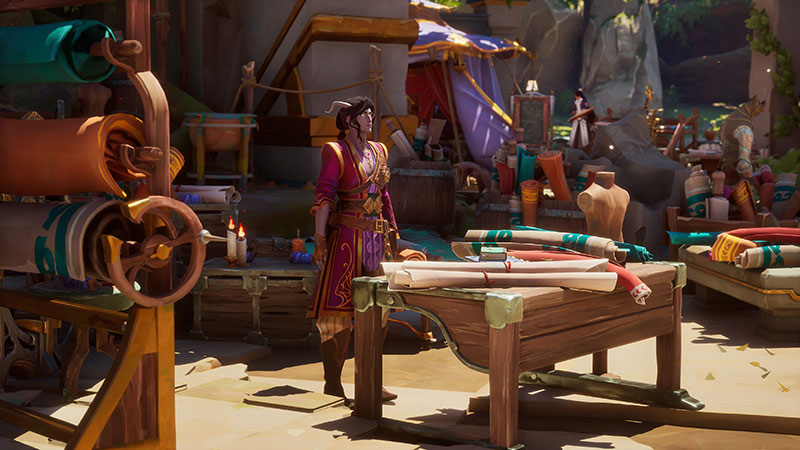
There once was a magic city where the weavers, magicians, created wondrous archons. Things went horribly wrong, a bloody war broke out, and the city sealed itself and the lands around it from the rest of the world. Now the few remaining weavers are despised, and they drift from settlement to settlement.
Our heroine is a new addition to a weaver caravan, a band of magic experts that include a smith, an atelier, and an alchemist among others. This particular caravan is heading straight for the city to surveil the barrier.
Things go horribly wrong once again, and the caravan ends up trapped within the barrier. They must now explore this new land.
This game gives you that unforgettable feeling of being dropped into a very good fantasy book. It’s weird. It has a feeling that is entirely its own. It’s the difference between Oblivion, which felt generic, and Skyrim, which had its own strange atmosphere. Eternal Strands has a vibe.
Launch Trailer (linked for the email readers.)
First things first: the game is gorgeous.
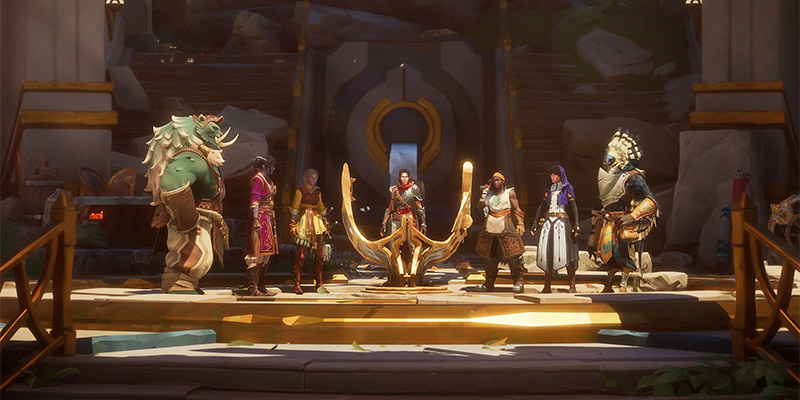
My merry band of companions.
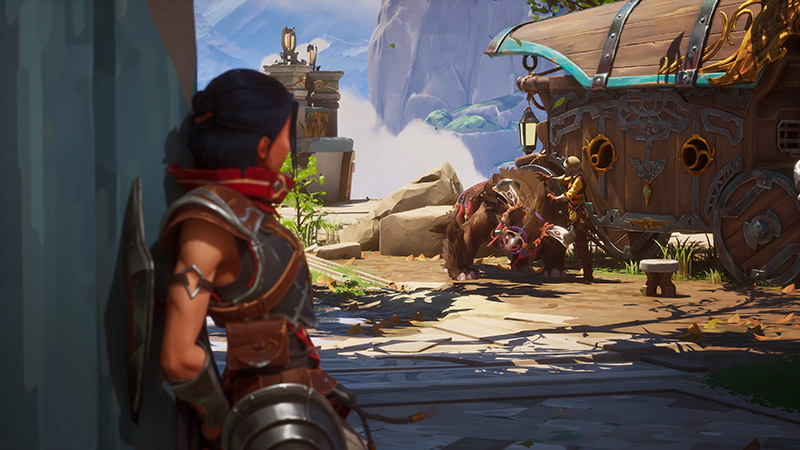
Relaxing moment in camp with the caravan’s quartermaster and whatever that owl bear critter is.
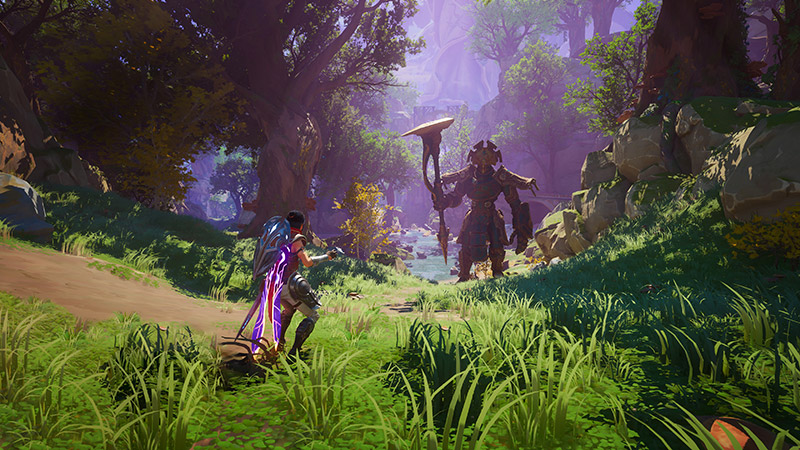
Oh noes.
So great story, great graphics, how is the combat?
You know how in some games, you can occasionally get somewhere high and drop a rock on your enemy and you feel super accomplished? Or when you set some flammable barrels that have no business lying around the battlefield on fire? Okay, the whole game is like that. Except there are no random barrels. It’s mostly explosive plants.
Gameplay Trailer (linked for the email readers.)
Everything is climbable.
First, you can climb anything. Everything. Tree? Yes. Weird obelisk sticking out of the ground? Yes. Mountain cliff? Yes.
You have your sword and a bow and all that, but you also start out with two magic powers called strands: ice and telekinesis. You are a weaver, after all. Ice makes ice, self explanatory. It slows down enemies, puts out fires, and it will damage you if you stand on it. Telekinesis lets you pick up things and yeet them. (To yeet (slang) means to throw something with a lot of force disregarding the consequences.)
Everything is yeetable, if it’s not too heavy.
So, if you suck at combat games, like yours truly, this opens up a whole new world of possibilities.
Here is how my gaming session went:
Me, mumbling to myself: Can I yeet this rock? Can I yeet that rock at this monster? Oh I missed, and the rock hit the tree, and now the tree broke? Can I yeet the tree? Ha! Can yeet the monster? Ha! Do I have anything else to yeet…
Gordon: What is your obsession with yeeting things?
Me: You do not understand this game.
You can freeze the enemy, yeet them at a mountain wall, drop a steel-rich rock on them, the rock will break, and then you can collect all the materials from the rock and the fallen enemy. I found a cave with ice, and since I do not have any fire powers and there were no explosive plants around, I bombarded the ice outgrowths within the cave with rocks, until I broke all of them, and then the ice melted, and I went in to get the treasure.
Everything is valuable.
The crafting system is so interesting. It breaks all crafting materials into 4 broad groups: forged, carved, woven, and tanned. So basically ore, stone, fabric, and leather. You can make weapons and armor, and every item requires a set number of resources. So if the armor requires 6 tanned resources, you can either put basic leather in, or dense akala fur, which better, or another resource that is even better, and what you slot in there changes the bonuses and stats.
And it changes the color of the armor.
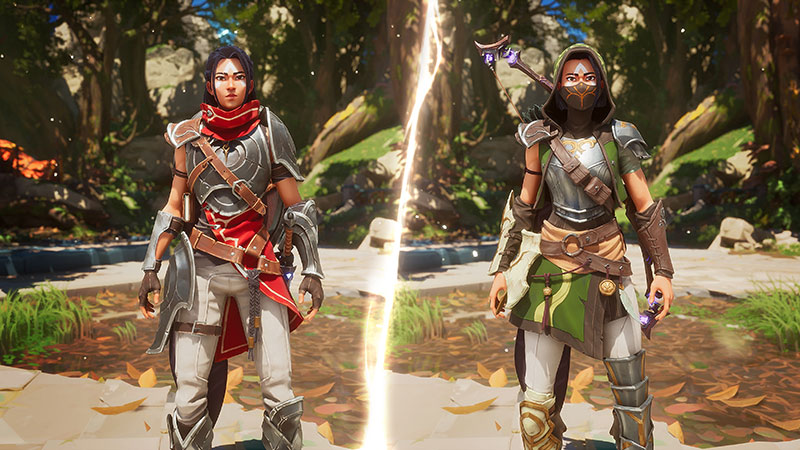
Dragon Age Inquisition, I see you! You remember when you would add one random piece of weird leather to your Inquisition outfit because you wanted the straps on the armor to be white or something? Hehe.
If you have a surplus of low level resources, you can turn them into camp supplies, which allow you to upgrade the caravan crafting stations. The inventory management is limited to materials. You are not going to be carrying a bunch of armor and weapons in your bag. It’s more mission based, meaning you equip yourself and head out.
I haven’t made it very far, because I have to work, but I did manage to beat the first boss on the first try, despite my gaming shortcomings, and I have made it to the Zone #2. But I’ve only played for four hours. My take on it right now – there is no grind. Like none. You’re not going up the levels, the progression is gear based, and it is all about exploring and finding weird loot stashed somewhere behind a rock, and looking for creative ways to nuke your enemies. There is much more that I could prattle on about – the weather, the day and night cycle, etc, etc.
So what are the negatives?
Well, no character creation, and while there is branching dialogue, I’m not sure the responses affect the story over all, but it does add the RPG flavor.
For some reason this game hasn’t been promoted as much as some others. I know the Avowed is coming, I’ve known about it for months, and this just popped out of nowhere. But now you also know it exists. There is a free demo on Steam that walks you through the prologue. The tutorial is very handholdy, but once you make it through, the game lets go and you are freeeee!
Have fun and let me know if you like it.
The post Eternal Strands first appeared on ILONA ANDREWS.
Monday Musings: Memories On Our Walls
A couple of weeks ago, a dear friend posted on Facebook an image of a photo print she’d purchased from me years ago, along with a caption saying she still considered the image one of the things in her living space that gives her joy. I was flattered beyond words. And I thought of her post this past week as Nancy and I finally got around to putting art on our walls.
We’ve only done the living room and dining room (and our respective offices), but already the house feels more like a home. I am itching to put up more. This week, perhaps.
I am fortunate to have learned photography as a younger man and to have captured a good number of display-worthy photos over the years. And so we have framed images from many of our travels that are, or will be, on our walls — pictures from Australia and New Zealand, from Ireland and the American Southwest, from our former home in Tennessee and from a memorable trip to New Mexico a few years back. I’m currently deciding which photos from more recent journeys I should print and frame next.
I am even more fortunate to be the younger brother of James Coe, a remarkably talented wildlife and landscape painter. Jim’s art is all over our house; in the rooms we’ve decorated so far we’ve hung nine of his paintings and prints. I expect there will be more before long. [By the way, you can read more about Jim and see images of his art at his website.]
 What else have I got? Several years back, while attending a World Fantasy Convention, I bought signed prints of Martin Springett’s marvelous cover art for Guy Gavriel Kay’s Fionavar Tapestry. Springett himself was selling the art and he was a charming and effective salesman! Some twenty years ago, while living in our little town in Tennessee, we became friends with Stephen Alvarez and his family. Stephen is an amazing freelance nature photographer, whose work has appeared in National Geographic, Time, the New York Times, and other high profile publications. He and his wife, April, also happen to be fantasy readers, so we arranged a trade: a complete signed, hardcover set of the Winds of the Forelands books in exchange for a print of a gorgeous night sky photo taken in Arizona. I think I got the better deal.
What else have I got? Several years back, while attending a World Fantasy Convention, I bought signed prints of Martin Springett’s marvelous cover art for Guy Gavriel Kay’s Fionavar Tapestry. Springett himself was selling the art and he was a charming and effective salesman! Some twenty years ago, while living in our little town in Tennessee, we became friends with Stephen Alvarez and his family. Stephen is an amazing freelance nature photographer, whose work has appeared in National Geographic, Time, the New York Times, and other high profile publications. He and his wife, April, also happen to be fantasy readers, so we arranged a trade: a complete signed, hardcover set of the Winds of the Forelands books in exchange for a print of a gorgeous night sky photo taken in Arizona. I think I got the better deal.
 We have a few nice pieces of art that once belonged to my parents. We have photos we purchased just outside of Zion National Park — photos of the park taken by photographer David J. West, with whom we chatted for a time one memorable morning. I have in my office a tiny framed pressed bronze image of a Celtic owl, which I love. And I have yet another signed photo print, this one by renowned nature photographer Larry Ulrich. It was a gift from my siblings for my 50th birthday. And we have a signed print from a Native American artist in the Pacific Northwest that we bought while on our honeymoon in Victoria, British Columbia. This print has hung over the mantel in every home Nancy and I have shared. It was the first piece we put up in the new house.
We have a few nice pieces of art that once belonged to my parents. We have photos we purchased just outside of Zion National Park — photos of the park taken by photographer David J. West, with whom we chatted for a time one memorable morning. I have in my office a tiny framed pressed bronze image of a Celtic owl, which I love. And I have yet another signed photo print, this one by renowned nature photographer Larry Ulrich. It was a gift from my siblings for my 50th birthday. And we have a signed print from a Native American artist in the Pacific Northwest that we bought while on our honeymoon in Victoria, British Columbia. This print has hung over the mantel in every home Nancy and I have shared. It was the first piece we put up in the new house.
 Of course, we have tons of smaller photos all around the house, of our darling daughters, of our parents and siblings, of friends, of our wedding.
Of course, we have tons of smaller photos all around the house, of our darling daughters, of our parents and siblings, of friends, of our wedding.
And I suppose the point of all of this is that every one of these pieces of art, every single thing that I have taken care to center on a wall and hang at the right height and fiddle with until it hangs straight (only to have Nancy come into the room and adjust it so that it really hangs straight) brings me joy. They remind me of places we’ve seen that stole our breath and seared themselves into our memories. They remind me of experiences we cherish and people we love.
Each time we put up something new, it invariably puts a smile on my face.
Take a look around your home, and let the memories stirred by the things you’ve put on your walls bring a smile. And if you care to, share a favorite or two on the Facebook feed for this post.
Have a great week.
Monday Musings: Memories On Our Walls
A couple of weeks ago, a dear friend posted on Facebook an image of a photo print she’d purchased from me years ago, along with a caption saying she still considered the image one of the things in her living space that gives her joy. I was flattered beyond words. And I thought of her post this past week as Nancy and I finally got around to putting art on our walls.
We’ve only done the living room and dining room (and our respective offices), but already the house feels more like a home. I am itching to put up more. This week, perhaps.
I am fortunate to have learned photography as a younger man and to have captured a good number of display-worthy photos over the years. And so we have framed images from many of our travels that are, or will be, on our walls — pictures from Australia and New Zealand, from Ireland and the American Southwest, from our former home in Tennessee and from a memorable trip to New Mexico a few years back. I’m currently deciding which photos from more recent journeys I should print and frame next.
I am even more fortunate to be the younger brother of James Coe, a remarkably talented wildlife and landscape painter. Jim’s art is all over our house; in the rooms we’ve decorated so far we’ve hung nine of his paintings and prints. I expect there will be more before long. [By the way, you can read more about Jim and see images of his art at his website.]
 What else have I got? Several years back, while attending a World Fantasy Convention, I bought signed prints of Martin Springett’s marvelous cover art for Guy Gavriel Kay’s Fionavar Tapestry. Springett himself was selling the art and he was a charming and effective salesman! Some twenty years ago, while living in our little town in Tennessee, we became friends with Stephen Alvarez and his family. Stephen is an amazing freelance nature photographer, whose work has appeared in National Geographic, Time, the New York Times, and other high profile publications. He and his wife, April, also happen to be fantasy readers, so we arranged a trade: a complete signed, hardcover set of the Winds of the Forelands books in exchange for a print of a gorgeous night sky photo taken in Arizona. I think I got the better deal.
What else have I got? Several years back, while attending a World Fantasy Convention, I bought signed prints of Martin Springett’s marvelous cover art for Guy Gavriel Kay’s Fionavar Tapestry. Springett himself was selling the art and he was a charming and effective salesman! Some twenty years ago, while living in our little town in Tennessee, we became friends with Stephen Alvarez and his family. Stephen is an amazing freelance nature photographer, whose work has appeared in National Geographic, Time, the New York Times, and other high profile publications. He and his wife, April, also happen to be fantasy readers, so we arranged a trade: a complete signed, hardcover set of the Winds of the Forelands books in exchange for a print of a gorgeous night sky photo taken in Arizona. I think I got the better deal.
 We have a few nice pieces of art that once belonged to my parents. We have photos we purchased just outside of Zion National Park — photos of the park taken by photographer David J. West, with whom we chatted for a time one memorable morning. I have in my office a tiny framed pressed bronze image of a Celtic owl, which I love. And I have yet another signed photo print, this one by renowned nature photographer Larry Ulrich. It was a gift from my siblings for my 50th birthday. And we have a signed print from a Native American artist in the Pacific Northwest that we bought while on our honeymoon in Victoria, British Columbia. This print has hung over the mantel in every home Nancy and I have shared. It was the first piece we put up in the new house.
We have a few nice pieces of art that once belonged to my parents. We have photos we purchased just outside of Zion National Park — photos of the park taken by photographer David J. West, with whom we chatted for a time one memorable morning. I have in my office a tiny framed pressed bronze image of a Celtic owl, which I love. And I have yet another signed photo print, this one by renowned nature photographer Larry Ulrich. It was a gift from my siblings for my 50th birthday. And we have a signed print from a Native American artist in the Pacific Northwest that we bought while on our honeymoon in Victoria, British Columbia. This print has hung over the mantel in every home Nancy and I have shared. It was the first piece we put up in the new house.
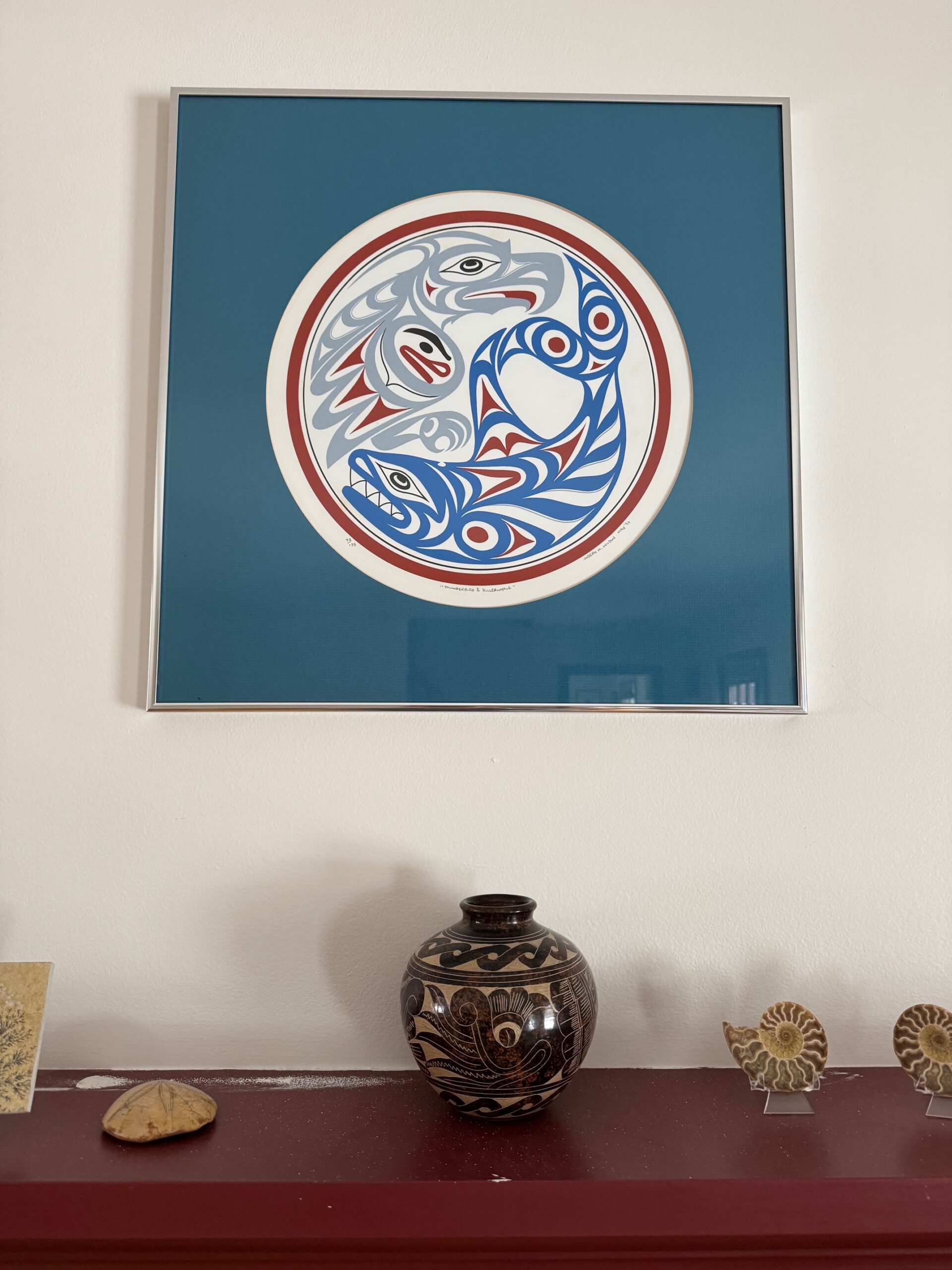 Of course, we have tons of smaller photos all around the house, of our darling daughters, of our parents and siblings, of friends, of our wedding.
Of course, we have tons of smaller photos all around the house, of our darling daughters, of our parents and siblings, of friends, of our wedding.
And I suppose the point of all of this is that every one of these pieces of art, every single thing that I have taken care to center on a wall and hang at the right height and fiddle with until it hangs straight (only to have Nancy come into the room and adjust it so that it really hangs straight) brings me joy. They remind me of places we’ve seen that stole our breath and seared themselves into our memories. They remind me of experiences we cherish and people we love.
Each time we put up something new, it invariably puts a smile on my face.
Take a look around your home, and let the memories stirred by the things you’ve put on your walls bring a smile. And if you care to, share a favorite or two on the Facebook feed for this post.
Have a great week.
State of the Author, February 2025 edition
Spotlight on “Claire Darling” by Callie Kazumi
She’s been ghosted. But she won’t be forgotten. LitStackers! Line up for this one. In…
The post Spotlight on “Claire Darling” by Callie Kazumi appeared first on LitStack.
Monday Meows
Hello fellow cats, I would like you to meet my fiance, Concretia!
You what now?
Do you think I should tell him?
Naw, it won’t help.
Beware of Greeks Bearing Gifts (and giant wooden horses. I mean, seriously!)
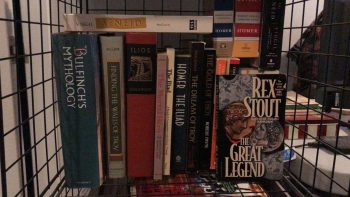 The story of Troy has been my favorite myth since I was a little kid. Greek mythology is far and away my favorite (Norse is a distant second), and I used to check Bullfinch’s out of my grade school library and lug it home. That was a relatively big book. I have my own copy now, of course.
The story of Troy has been my favorite myth since I was a little kid. Greek mythology is far and away my favorite (Norse is a distant second), and I used to check Bullfinch’s out of my grade school library and lug it home. That was a relatively big book. I have my own copy now, of course.
The worst part, is I always root for the Trojans. It never ends well for them. If they had just listened to Laocoon. Though, Athena definitely made that a dangerous proposition…
I’ve used a couple names from Thieves World over the years, in various online RPGs. But hands down, the Iliad has been my main source. Hector, and some variation of Astyanax (I prefer it with more ‘N’ or ‘X’, has far and away my favorite names for fighters (especially paladins). I’ve used a few others, like Penthesilia, Cassandra, and Deiphobus (Helenus just doesn’t work for me).
Way back in pre-Windows days (I think), there was a really cool computer game that included a Troy section. I think you were Jason with his Argonauts, roaming the world. Age of Empires II (man, I played the heck out of that) included a Troy campaign (except I had to sack Troy. Sniff, sniff). There’s a Total War: Troy (kind of a scaled down TW game) that I don’t have yet. You might have read over the past couple weeks that I’m a huge Total War: Warhammer I/II fan.
I don’t do the Assassin’s Creed series, butt there was an Odyssey game, recently. The Odyssey is essentially a sequel to The Iliad. As is Virgil’s The Aeneid.
I read a few translations over the years. But the only version I do now is Robert Fagles’ audiobook. Which, unfortunately, is abridged. I always try to get unabridged versions of books. But for some reason, they never did an unabridged for Fagles. I don’t know what got left out, but it still totally works for me.
I talked about it here, and Derek Jacobi is absolutely FANTASTIC. Probably the best-read audiobook I’ve ever listened to. They had Ian McKellen do Fagles’ Odyssey, and Simon Callow read The Aeneid (Callow is number two, with McKellan still good, but third). Jacobi is nothing short of brilliant.
As I’ve talked about here at Black Gate before, audiobooks let me get to things I otherwise would not read. Old, and new. About once a year, I listen to The Iliad CDs in my car, during the work commute. Some years, I follow it up with The Odyssey. I don’t do The Aeneid that often, but I have listened to it more than once.
The Iliad and The Odyssey are believed to be written not very long apart; both in Greek. As with some of Paul’s Epistles, some think Homer did not author both. I’m just gonna go with ‘Yes, he did.’ The Aeneid as written some six centuries later, in Latin.
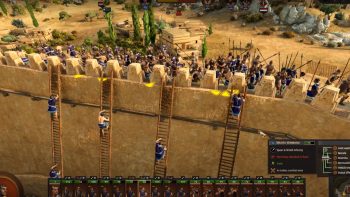 Highly recommend Fagles’ translation, with Jacobi’s reading. I have him doing some Sherlock Holmes and it’s okay. But he slays The Iliad.
Highly recommend Fagles’ translation, with Jacobi’s reading. I have him doing some Sherlock Holmes and it’s okay. But he slays The Iliad.
The Iliad ends with Hector’s funeral games. Homer recounts some of the events after – including that frigging horse – in The Odyssey.
There were other poems by other poets, about The Trojan War. For example, Arctinus of Miletus wrote the five-book Aethiopis. It started right after The Iliad ended, with the arrival of the the Amazon Queen, Penthesileia
There are six additional poems, but sadly, they’re lost. About thirty lines of Lesches of Pyrrha’s Little Iliad is the largest surviving excerpt of these lost Ilios stories. Along with The Iliad and The Odyssey, they make up The Epic (or Trojan) Cycle. Click here for a short look at the lost poems.
I bought Heinrich Schliemann’s Ilios decades ago. It is not exactly light reading. The Mortal Hero is a nice intro to The Iliad, and I recommend that for somebody wanting to dig into it, without actually reading the epic. Though I think should read Homer.
The Brad Pitt movie, Troy, was a big-budget telling of the story. It took out all the mythology. Maybe that made sense from an on-screen perspective, but I was disappointed. It’s an okay movie. I waited a long time for somebody to make Troy, and to make 42 (the Jackie Robinson story). I much prefer the latter.
I tried to sit through the 2018 mini-series, Troy: Fall of A City. What an unwatchable load of garbage.
On my ever-growing ‘To Write About’ list here at Black Gate, is Rex Stout’s The Great Legend. Stout, of course, created Nero Wolfe, who I have written about extensively here at Black Gate. He took the gods out of the picture, and told an alternate story. I like it.
Stephen Fry has written three apparently ‘different’ books on Greek mythology, with book three on Troy. I’m not interested, and haven’t checked them out.
I’m listening to Barry Strauss’ 2007 book, The Trojan War: A New History. The reader’s voice doesn’t do much for me so it’s gonna be a slow almost 9 hours, but it’s interesting enough, an hour in.
An idea I’ve had,which I won’t commit the time and effort to, is a daily FB series. I would post amusing (to me) daily updates from some embedded poet/journalist:
“And we’ve landed on a rather nice beach. I imagine we’ll wrap this up in a week or two and head back home.”
Or maybe a foot soldier in the Greek ranks:
“Man, Achilles was in a foul mood this morning. That guy needs to lighten up.”
So, this has just been some rambling on something I’ve been interested in for most of my life.

Bob Byrne’s ‘A (Black) Gat in the Hand’ made its Black Gate debut in 2018 and has returned every summer since.
His ‘The Public Life of Sherlock Holmes’ column ran every Monday morning at Black Gate from March, 2014 through March, 2017. And he irregularly posts on Rex Stout’s gargantuan detective in ‘Nero Wolfe’s Brownstone.’ He is a member of the Praed Street Irregulars, founded www.SolarPons.com (the only website dedicated to the ‘Sherlock Holmes of Praed Street’).
He organized Black Gate’s award-nominated ‘Discovering Robert E. Howard’ series, as well as the award-winning ‘Hither Came Conan’ series. Which is now part of THE Definitive guide to Conan. He also organized 2023’s ‘Talking Tolkien.’
He has contributed stories to The MX Book of New Sherlock Holmes Stories — Parts III, IV, V, VI, XXI, and XXXIII.
He has written introductions for Steeger Books, and appeared in several magazines, including Black Mask, Sherlock Holmes Mystery Magazine, The Strand Magazine, and Sherlock Magazine.
Matthew Corbett fan fiction by Pete Mesling
 At the Leviathan book launch, Robert McCammon told me that, now that the series was complete, he would love to see other people write Matthew Corbett fan fiction.
At the Leviathan book launch, Robert McCammon told me that, now that the series was complete, he would love to see other people write Matthew Corbett fan fiction.
Author Pete Mesling has done just that, and we’re proud to present “Troubling the Past,” his story set in Matthew Corbett’s world!
Pete also narrates the story in a YouTube video on his channel. From Pete:
“Troubling the Past” is my foray into fan fiction. Set in the world of Robert McCammon’s Matthew Corbett books, my story occurs before the events of The King of Shadows and aims to do a little after-the-fact foreshadowing of that novel. I wouldn’t say it contains any spoilers per se, but you may find “Troubling the Past” more enjoyable if you’ve read McCammon’s novel first (all of the Corbett novels, actually).
You have several options available:
- Read the story on RobertMcCammon.com
- Download an AZW3 ebook
- Download an EPUB ebook
- Download a MOBI ebook
We’d love to see more! From Robert McCammon: “The fun and interesting thing here is that you can do straight mystery stories, character studies, or delve into the supernatural as much as you please.” Submissions can be sent to the webmaster.
Half a Century of Reading Tolkien: Part Two – The Fellowship of the Ring by JRR Tolkien
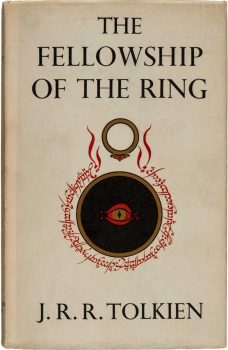 ‘I will take the Ring,’ he said, ‘though I do not know the way.’
‘I will take the Ring,’ he said, ‘though I do not know the way.’
Frodo from The Council of Elrond from The Fellowship of the Ring (1954)
I never saw it, but once upon a time, some hippies and ancillary types were given to emblazoning FRODO LIVES on bedroom walls and the backs of denim jackets. The Lord of the Rings, the literary creation of a conservative Oxford University professor of English Literature and Language, had somehow hit a chord with the nascent counterculture after its publication in 1954/1955. I imagine, in fact, I know, there are all sorts of popular and academic works purporting to explain why this was. I’ve never been interested in them, preferring the books themselves to present the professor’s ideas.
I have my own, if not particularly original, theories. First, it’s a great adventure story featuring a small, ineffectual-seeming hero who stands up to his world’s greatest force of evil. Second, it came to be seen as a sort of rallying cry against the dark powers of the modern world. I don’t know Prof. Tolkien’s politics, though I suspect he was a small-c conservative. It’s clear he viewed the loss of tradition and the dark Satanic mills blotting out the green and pleasant England of his youth were a terrible assault on civilization (this anti-modernist attitude is an important element of Michael Moorcock’s disdain for him). Third, the counterculture’s love for anything pastoral and ante-technological was probably the most important reason for its breakout into the mainstream’s consciousness.
I never discussed it with him, but I feel confident when writing that my father liked The Lord of the Rings primarily for the first reason and somewhat for the second (he was very much a BIG-C conservative) a bit. He most definitely did not like it for the last. When I first read it all that mattered to me was that first reason. With every revisit over the ensuing decades, I’ve discovered something new. That has carried on with my most recent reread.
For the handful of uninitiated out there, The Fellowship of the Ring (comprised of two books, Book I: The Ring Sets Out and Book II: The Ring Goes South), tells of the discovery that the magic ring Bilbo Baggins found in The Hobbit is really the single most evil artifact in the world and the start of the quest to destroy it. Bilbo’s heir, Frodo, and his gardener, Sam Gamgee, at the advice of the wizard Gandalf, set out for Rivendell. Following up on his suspicions about the ring, Gandalf spent over a decade hunting down the true nature of the ring. Finally, he determined Bilbo’s ring was the One Ring, the thing by which the Dark Lord (probably the first of such figures in fantasy fiction), Sauron, could seize control of all Middle-earth.
The four hobbits encounter numerous obstacles along the road to Rivendell of increasing peril. The most dangerous is their pursuit by the Nazgûl (Ring Wraiths). They are Sauron’s greatest servants, corrupted ages ago by lesser rings he made for Men.
In Rivendell, a plan is devised to destroy the Ring by dropping it in Mount Doom, the volcano it was originally forged in and the only thing that can destroy it. A party of nine, chosen from representatives of the different races of Middle-earth and led by Gandalf, set out toward the Dark Lord’s land, Mordor. Of course, things start going wrong right away. Before The Fellowship‘s end, two of the nine companions are dead, and the rest are split into three separate groups. I’ll leave it there. If you’ve read the books, you can fill in the blanks and if you haven’t, well, go fix that giant gap in what you’ve read.
 Moria by Alan Lee
Moria by Alan Lee
The book remains as enthralling to me as did when I first read it nearly fifty years ago. It’s filled with numerous scenes that filled me with awe on the first encounter that has never left me over the years. There are the monolithic Argonath, statues of ancient kings, standing watch over the borders of the kingdom of Gondor and the tree city of Caras Galadhon. The most striking thing was the ancient dwarven city of Khazad-dûm. I knew dwarves lived underground, but I hadn’t imagined anything like Moria. Like the nine companions, the readers are only given glimpses of Moria’s dark passageways, but they’re enough to convey its massiveness and harsh beauty.
Gandalf seemed pleased. ‘I chose the right way,’ he said. ‘At last we are coming to the habitable parts, and I guess that we are not far now from the eastern side. But we are high up, a good deal higher than the Dimrill Gate, unless I am mistaken. From the feeling of the air we must be in a wide hall. I will now risk a little real light.’
He raised his staff, and for a brief instant there was a blaze like a flash of lightning. Great shadows sprang up and fled, and for a second they saw a vast roof far above their heads upheld by many mighty pillars hewn of stone. Before them and on either side stretched a huge empty hall; its black walls, polished and smooth as glass, flashed and glittered. Three other entrances they saw, dark black arches: one straight before them eastwards, and one on either side. Then the light went out.
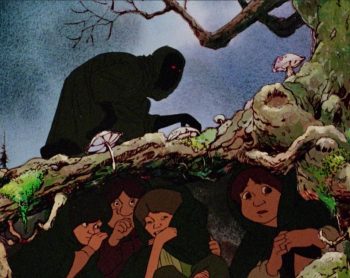 Ralphi Bakshi’s rotoscoped Ring Wraith and the hobbits
Ralphi Bakshi’s rotoscoped Ring Wraith and the hobbits
This time around, the outward journey of the hobbits, Frodo, Sam, Merry, and Pippin, from the bucolic seclusion of the Shire, by degrees, into the wider, wilder world they have been largely unaware of caught my eye. The first encounter occurs while still in the Shire when they hear the sound of hooves coming along the road.
The hoofs drew nearer. They had no time to find any hiding-place better than the general darkness under the trees; Sam and Pippin crouched behind a large tree-bole, while Frodo crept back a few yards towards the lane. It showed grey and pale, a line of fading light through the wood. Above it the stars were thick in the dim sky, but there was no moon.
The sound of hoofs stopped. As Frodo watched he saw something dark pass across the lighter space between two trees, and then halt. It looked like the black shade of a horse led by a smaller black shadow. The black shadow stood close to the point where they had left the path, and it swayed from side to side. Frodo thought he heard the sound of snuffling. The shadow bent to the ground, and then began to crawl towards him.
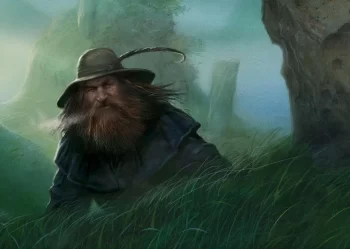 Tom Bombadil by John Howe
Tom Bombadil by John Howe
The second and stranger encounter occurs in the shadowed depths of the Old Forest. Once, many years ago, something from the Forest had somehow pushed back against the invading hobbits. In retaliation, the hobbits burned many of the trees and built a great hedge to keep the rest of them at bay. Once inside the dark woods, the hobbits are lured and trapped by an ancient, malicious willow tree only to be saved by one of the most divisive figures in fantasy – Tom Bombabil. Tom saves the hobbits again, as they continue away from their homes, and are trapped by evil spirits infesting ancient barrows. Their experience in the barrows gives visions to the hobbits, impressing on them the depths and width of the world outside their cozy borders.
This brings me to the second thing I paid more attention to on this reading: the moments of mystery and strangeness. Some hate Bombadil because he’s too frivolous. Others maintain he was just jammed into the story because Tolkien, who’d created the character for an earlier poem, liked him too much. I hold to the theory that for the whole first part of The Fellowship, Tolkien was feeling his way into the story, letting events grow spontaneously and I love the character, silly songs and all.
In the seemingly areligious Middle-earth (that’s a complicated bit of business for some other time, perhaps), Bombabil feels distinctly divine. He is married to the daughter of the river, “knew the dark under the stars when it was fearless – before the Dark Lord came from Outside,” and sings down the very stones of the haunted barrow. When asked about him, Tolkien responded that he was “not an important person – to the narrative” and that “he represents something that I feel important, though I would not be prepared to analyse the feeling precisely. I would not, however, have left him in, if he did not have some kind of function.” He alone, of everyone in Middle-earth, is impervious to the power of the Ring. It doesn’t work for him and he has no desire to own it. I love that there is no explanation for him, an element that doesn’t find an explanation in any of the vast history Tolkien composed for Middle-earth. To quote his wife, when asked who he is, she simply replies, “He is.”
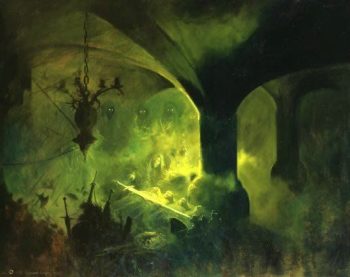 Barrow Wight by Paul Raymond Gregory
Barrow Wight by Paul Raymond Gregory
Being swallowed alive by a willow tree, evil or otherwise, is of course fairy tale strange. The haunted barrows and the capture of the hobbits by the barrow wights are more akin to the Germanic tales that partially inspired Tolkien. Trying to cross the downs, the hobbits find themselves imprisoned within one of the barrows. It is the eeriest point in the entire book, and could easily have been lifted from some skald’s ancient tale sung by the fireside.
As he lay there, thinking and getting a hold of himself, he noticed all at once that the darkness was slowly giving way: a pale greenish light was growing round him. It did not at first show him what kind of a place he was in, for the light seemed to be coming out of himself, and from the floor beside him, and had not yet reached the roof or wall. He turned, and there in the cold glow he saw lying beside him Sam, Pippin, and Merry. They were on their backs, and their faces looked deathly pale; and they were clad in white. About them lay many treasures, of gold maybe, though in that light they looked cold and unlovely. On their heads were circlets, gold chains were about their waists, and on their fingers were many rings. Swords lay by their sides, and shields were at their feet. But across their three necks lay one long naked sword.
Suddenly a song began: a cold murmur, rising and falling. The voice seemed far away and immeasurably dreary, sometimes high in the air and thin, sometimes like a low moan from the ground. Out of the formless stream of sad but horrible sounds, strings of words would now and again shape themselves: grim, hard, cold words, heartless and miserable. The night was railing against the morning of which it was bereaved, and the cold was cursing the warmth for which it hungered. Frodo was chilled to the marrow. After a while the song became clearer, and with dread in his heart he perceived that it had changed into an incantation:
Cold be hand and heart and bone,
and cold be sleep under stone:
never more to wake on stony bed,
never, till the Sun fails and the Moon is dead.
In the black wind the stars shall die,
and still on gold here let them lie,
till the dark lord lifts his hand
over dead sea and withered land.
He heard behind his head a creaking and scraping sound. Raising himself on one arm he looked, and saw now in the pale light that they were in a kind of passage which behind them turned a corner. Round the corner a long arm was groping, walking on its fingers towards Sam, who was lying nearest, and towards the hilt of the sword that lay upon him.
None of these moments make it into Peter Jackson’s film of The Fellowship of the Ring. They don’t serve the narrative thrust Jackson chose to focus on. What they do is help convey the transition of the hobbits — and the story — from the pocket world of the Shire to the real world, one beset by betrayal, ravaging armies, and supernatural evil. Taken together with the dangerous episodes, they serve as a sort of veil the hobbits, representatives of the traditional, insular England Tolkien loved, must pass through before the real quest — the one to destroy the Ring — can begin.
Which leads me to Jackson’s movie, The Fellowship of the Ring (2001). That’s in fact what started this whole undertaking. Even though I’m on record disliking the movies, I needed something on in the background while doing some work and something with swords and magic seemed the right choice. Within minutes I found my dislike bubbling up. Soon it was boiling over. The easiest solution was to just pick up the books and read them again — which I did.
The thing is, I kept watching the movie, quickly followed by the other two. It’s the closest I’ve come to really hate watching anything in my life. I’ll go into more detail when I get to The Two Towers and The Return of the King as they deviate the most from the books.
I don’t dislike the movies for things Jackson didn’t do. If Verdi can edit Shakespeare, Jackson can edit Tolkien. I understand leaving out all the things I described. While I think their elimination changes the nature of the story, removing them to speed up the film’s momentum makes cinematic sense. The movie is intended as an exciting, action-filled movie, not a travelogue. Characters are compressed or excised in service of fitting a large book onto the screen. It happens all the time, often quite successfully. And still, I dislike the movies.
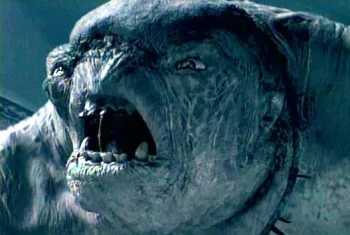 My easiest complaint is with filmmaking choices. First, are the moments of slow motion. Frodo getting stabbed and an uruk-hai running along a riverbank are the two moments that jump to mind most readily. They look cheap and terrible and stand out in a movie that lavished millions on looking good. Much worse is the fight and flight through Moria which becomes increasingly computer game-like as it proceeds. There is no architectural explanation that can possibly justify the staircase that collapses as our heroes are running down it. The battle in the book is much better choreographed and makes much more sense. Jackson’s camera work is skittery and nothing ever stays in a shot long enough to make much of an impression. The interaction between the characters and CGI troll looked fake twenty-plus years ago and only more so now. There are numerous other moments of interpretation I could argue about. Jackson always chose BIGGER and BOLDER, eschewing texture, subtlety, and atmosphere.
My easiest complaint is with filmmaking choices. First, are the moments of slow motion. Frodo getting stabbed and an uruk-hai running along a riverbank are the two moments that jump to mind most readily. They look cheap and terrible and stand out in a movie that lavished millions on looking good. Much worse is the fight and flight through Moria which becomes increasingly computer game-like as it proceeds. There is no architectural explanation that can possibly justify the staircase that collapses as our heroes are running down it. The battle in the book is much better choreographed and makes much more sense. Jackson’s camera work is skittery and nothing ever stays in a shot long enough to make much of an impression. The interaction between the characters and CGI troll looked fake twenty-plus years ago and only more so now. There are numerous other moments of interpretation I could argue about. Jackson always chose BIGGER and BOLDER, eschewing texture, subtlety, and atmosphere.
Tolkien’s Lord of the Rings isn’t devoid of humor. There’s Bilbo’s speech at his party and the discovery of the petrified trolls from The Hobbit. The thing is, there isn’t any slapstick. Not a bit. By which I mean especially pan-swinging, or dwarf-tossing. It’s awful and, like the slow motion, stands out in a movie that presents itself as a serious interpretation of a serious literary work.
My greater criticism is the film’s handling of the characters. Merry and Pippin are reduced to bad comic relief, instead of the clever conspirators who prove brave enough to maim and kill several orcs before Boromir is killed. Gandalf acts like a terrified fool in one moment and isn’t clever enough to solve the riddle to open the Gates of Moria himself. Boromir is more despicable seeming on the screen, instead of a man slowly being driven to madness by the Ring.
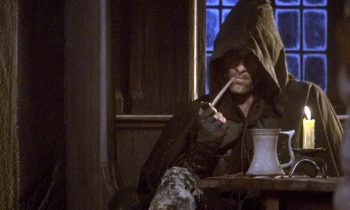 Most egregiously, Aragorn, born of an ancient line of kings, and raised to be a king, becomes a reluctant hero on the screen. We’re told he turned from the path of kingship long ago and later he says being king isn’t his goal. Aragorn is a man who has been a hero several times during his long life prior to the book, all for the purpose of opposing Sauron and restoring the kingship of a reunited kingdom. Finally, Elrond’s sworn he may only marry his daughter, Arwen, if he succeeds in his quest to become king.
Most egregiously, Aragorn, born of an ancient line of kings, and raised to be a king, becomes a reluctant hero on the screen. We’re told he turned from the path of kingship long ago and later he says being king isn’t his goal. Aragorn is a man who has been a hero several times during his long life prior to the book, all for the purpose of opposing Sauron and restoring the kingship of a reunited kingdom. Finally, Elrond’s sworn he may only marry his daughter, Arwen, if he succeeds in his quest to become king.
Instead of channeling the great heroes and chieftains of legend, Aragorn is reduced to, using one online site’s description, emo Aragorn. It feels like Jackson was incapable of believing someone could simply be portrayed as a hero, but needed to go on some sort of journey that almost forced him into choosing to be king.
There are loads of other things I don’t like about the movie. Most, though, are matters of taste, I suppose. Neither Viggo Mortensen nor Sean Bean are physically big enough or powerful enough for their roles. I don’t like many of the costumes, and I hate the portrayal of the hobbits as country bumpkins and Frodo is too young. The worst thing in the extended edition is the elf guard at Lothlorien’s five o’clock shadow.
I do like some things. Ian McKellen looks perfect. The Shire and the much of the wilderness countryside look like how I imagine they should. Galadriel taking on a terrifying visage when she imagines what she’d be with the One Ring is as exactly disturbing as it should be. Best of all, the death of Boromir, something that doesn’t come across as grandly tragic in the book as it should, is done brilliantly on the screen. That’s about it, though.
If this all seems a bit rambling, I’m sorry. Like last month, the spirit of Tolkien overpowered any original intentions I had. The result is this wandering around how The Fellowship of the Ring struck me on this tenth, or whatever it is, reading. I think I concentrated on those early chapters because excised from the movies, they are unknown to many who’ve never actually read the books. The book is much looser and messier than the movies and maybe that’s a reason I prefer it.
Fletcher Vredenburgh writes a column each first Sunday of the month at Black Gate, mostly about older books he hasn’t read before. He also posts at his own site, Stuff I Like when his muse hits him.
Alabama Writers Hall of Fame Class of 2025
The Alabama Center for the Book and the Alabama Writers’ Forum are excited to announce the Alabama Writers Hall of Fame Class of 2025! Tickets to the Awards Gala are on sale now!
Eight distinguished authors will be inducted into the Alabama Writers Hall of Fame at The University of Alabama’s Bryant Conference Center on Friday, March 7th , 2025.
The 2025 class inductees include Ace Atkins, Frye Gaillard, Joy Harjo, Janice Harrington, Robert McCammon, and Dr. Sue Brannan Walker. Authors C. Eric Lincoln and Brad Watson will be inducted posthumously.
Tickets can be purchased here.
The honor was first announced in May 2025. You can read about it here.
Comment on A Beginner’s Guide to Drucraft #30: Motion Sigls (II) by Valentin
I’am a little puzzled abouth this question: Is essentia effected by gravity?
If it wouldn’t, I guess it would have a hard time sticking to the earth, because it shouldn’t be effected by objects that aren’s drucrafters and earth is quiet quick. But if it is, I must wonder if there is essentia on the moon or the sun and then, due to sun’s enormous mass, it seams that there must be a realy big well in the sun. Is that right? Will we see space action in the series?
Roy Thomas and the Legacy of Conan the Barbarian
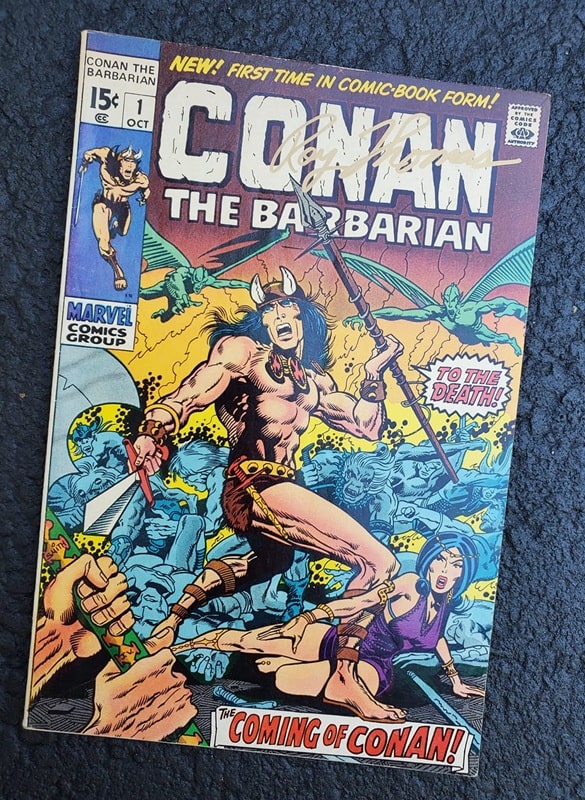 Conan The Barbarian #1 (Marvel Comics, October 1970). Art by Barry Windsor Smith
Conan The Barbarian #1 (Marvel Comics, October 1970). Art by Barry Windsor Smith
The package I received on July 6, 2020 brought me great joy! Roy Thomas is my favorite comic book writer. I correspond with him occasionally, and he is quite generous with his time, sharing his thoughts and memories. Very similar to how Gary Gygax did this, treating every fan with dignity and respect. A true gentleman.
I thanked Roy in my latest Hyperborea adventure book, The Sea-Wolf’s Daughter, because it included a character inspired by one of his creations. I sent him a copy of the book, and along with it my personal copy of Conan the Barbarian #1, to be signed by the author. Well, here it is! (He has an agency that normally handles this sort of thing, but he made an exception for me.) Excelsior!
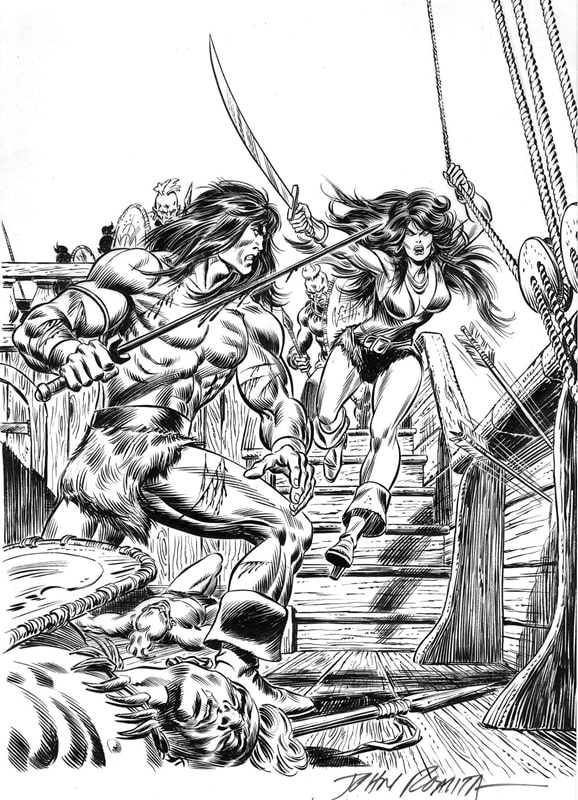 Cover art for Conan the Barbarian #58, by John Romita Sr., story by Roy Thomas (Marvel Comics, January 1976)
Cover art for Conan the Barbarian #58, by John Romita Sr., story by Roy Thomas (Marvel Comics, January 1976)
It is my humble opinion that of all the Conan pastiche writers, Roy Thomas is among the finest. But because he wrote in the comics industry, he’s often not afforded the same prestige as other Conan pastiche writers, such as L. Sprague de Camp, Lin Carter, Karl Edward Wagner, Robert Jordan, et al.
Thomas’ run starring Conan and Belit (the Queen of the Black Coast) started with this issue (#58) and concluded with the iconic issue #100. It is a treasure to read.
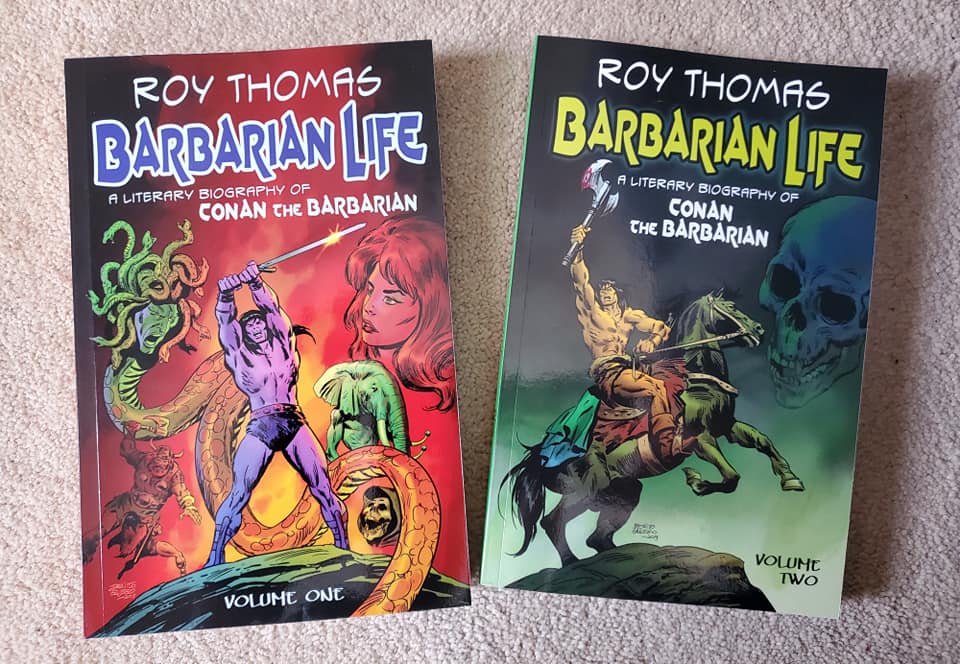 The first two volumes of Barbarian Life by Roy Thomas (Pulp Hero Press, December 7, 2018 and November 29, 2019)
The first two volumes of Barbarian Life by Roy Thomas (Pulp Hero Press, December 7, 2018 and November 29, 2019)
In the three volumes of Barbarian Life, Roy Thomas reflects on each of the first 100 issues of Conan the Barbarian, by Marvel Comics — which he wrote every issue of, from 1970 to 1979.
Roy is responsible for taking part in the creation of many Marvel and DC characters that have been featured in blockbuster films, but he will be the first to tell you that his favorite job was writing Conan the Barbarian, adapting and expanding on the works of Robert E. Howard and several other pastiche writers. What an incredible idea by Mr. Bob Mclain of Pulp Hero Press!
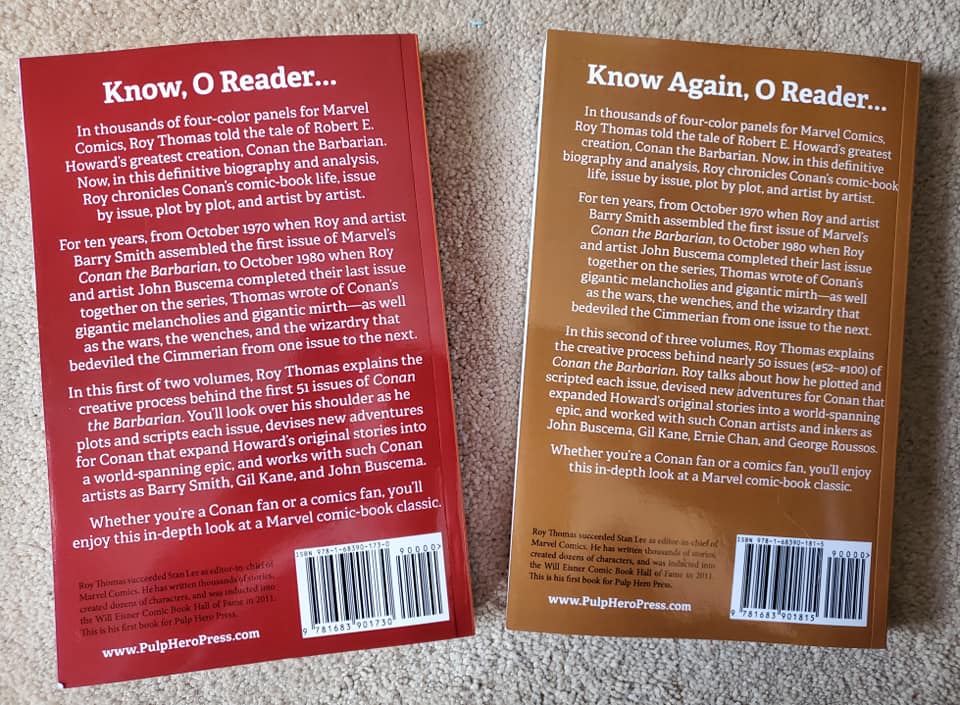 Back covers for Barbarian Life, volumes 1 and 2
Back covers for Barbarian Life, volumes 1 and 2
I can’t wait to dig into these two volumes; in fact, I have this crazy notion in me noggin about starting a blog in which I go through all 100 issues, reading the comic, followed by its respective chapter entry in the literary biography.
I’ve never blogged before, but I think this could be my motivation to give it a try in 2020. Would anyone be interested reading something like this?
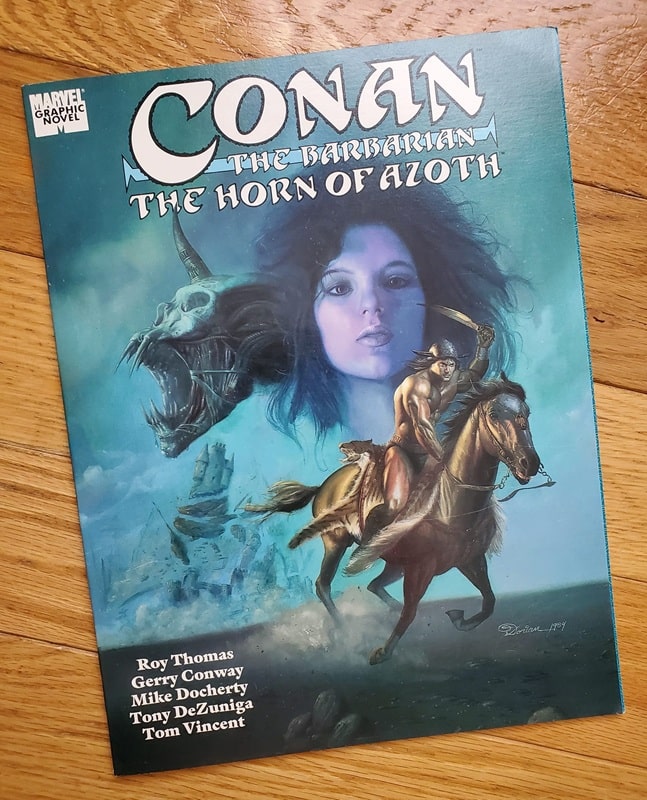 Conan: The Horn of Azoth, by Roy Thomas, Gerry Conway, Mike Docherty, Tony DeZungia, and Tom Vincent (Marvel Enterprises, January 1, 1990)
Conan: The Horn of Azoth, by Roy Thomas, Gerry Conway, Mike Docherty, Tony DeZungia, and Tom Vincent (Marvel Enterprises, January 1, 1990)
Above is Conan: The Horn of Azoth, aka Conan, King of Thieves, aka Conan the Destroyer.
Written by Roy Thomas and Gerry Conway, penciled by Mike Docherty, inked by Tony DeZuniga, and colored by Tom Vincent, this graphic novel, published in 1990 by Marvel Comics, has a fascinating publication history. For the complete history, definitely read the introduction by Thomas and Conway. What I am presenting is an abridged version of that story.
– It didn’t start off as a graphic novel; rather, it was the screenplay for the second Conan film, starring Arnold Schwarzenegger.
– In 1982, Universal producer Ed Pressman hired Thomas and Conway to write the script. Roy Thomas had previously worked as a consultant for the Conan the Barbarian.
– Roger Donaldson was to be the director.
– Barry Windsor-Smith was brought in to do concept art.
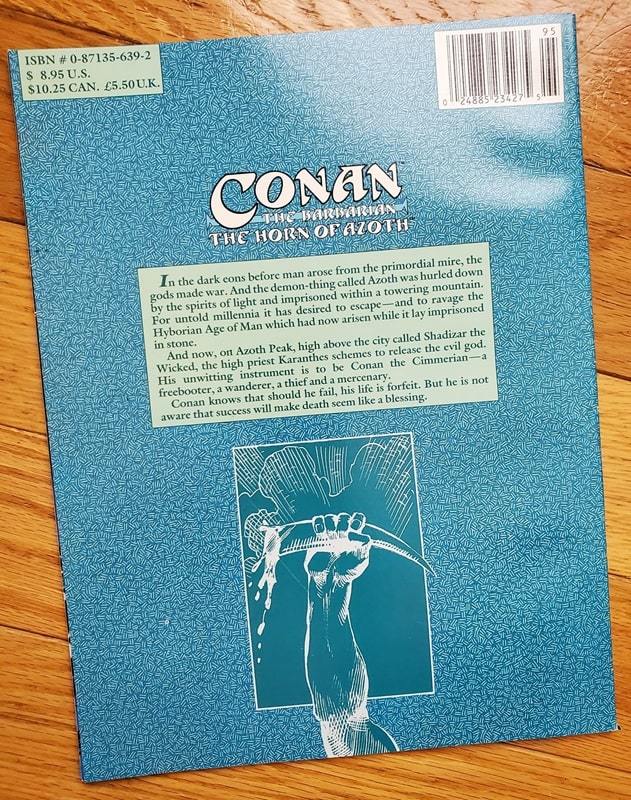 Back cover for Conan: The Horn of Azoth
Back cover for Conan: The Horn of Azoth
– Universal producer Pressman wanted it to be “lighter” (PG), so Thomas and Conway had to jettison some of their ideas. Result was their screenplay, Conan, King of Thieves.
– Pressman loved the screenplay, but sold his rights to Dino DeLaurentis.
– Dino was less familiar with REH and Conan, and he had his own ideas.
– The director, Donaldson, was removed. Dino wanted a lot of changes to the script. The storyline was continually adjusted.
– Dino hated leeches and rats and had them removed from the script. He wanted no stop-animation monster transformation, so the main monster had to be changed.
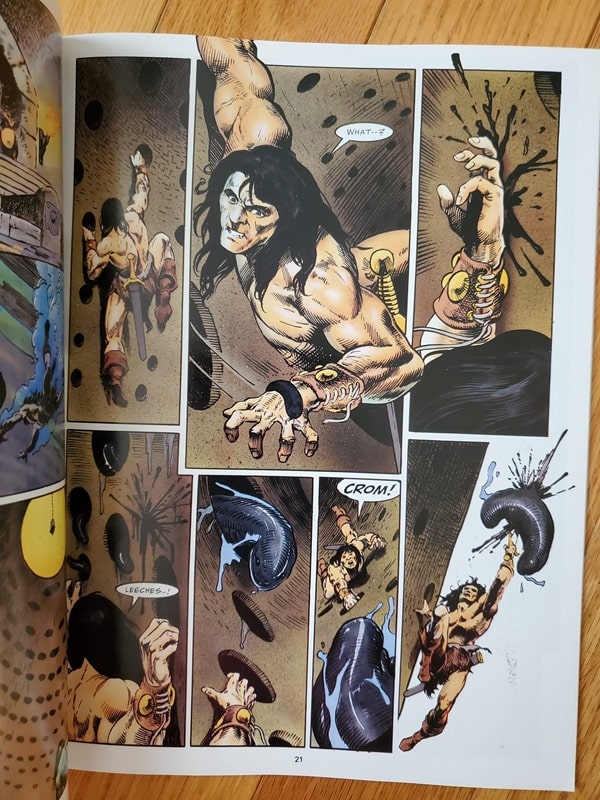
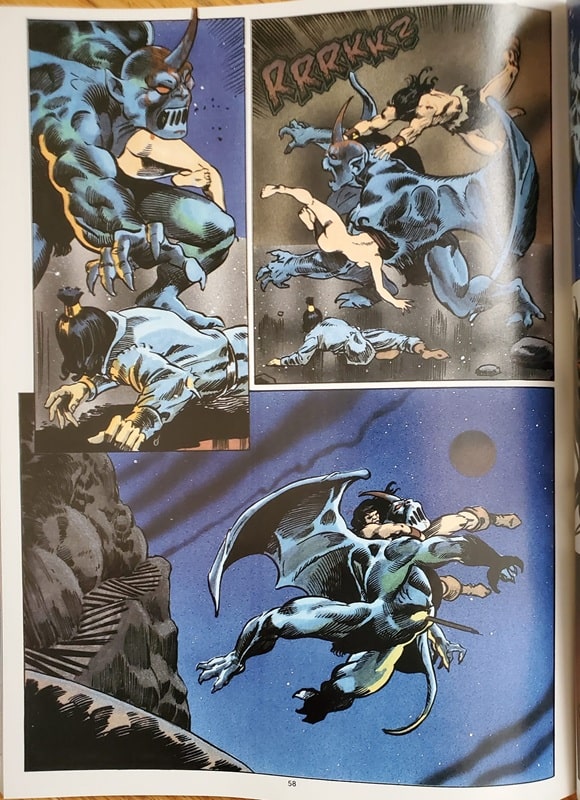
Interiors from The Horn of Azoth
– Richard Fleischer was hired as director. He came in with his own ideas and hired a new screenwriter to replace Thomas and Conway.
– Thomas and Conway had to fight for a screen credit in Conan the Destroyer. The Writers Guild decided that there were significant elements of the Thomas and Conway script that were retained, so they won.
– The original screenplay by Thomas and Conway was well-liked in the industry and led to further work for the two.
– Marvel editor Craig Anderson loved it, too, so they turned it from a 130-page screenplay to a 62-page graphic novel, published by Marvel.
And there you have it, Conan: The Horn of Azoth.
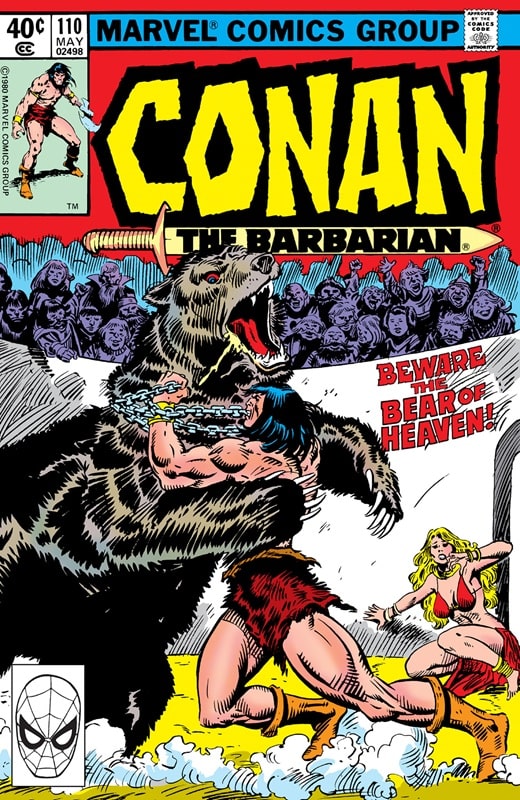 Conan the Barbarian #110, by Roy Thomas, John Buscema, and Al Milgrom (Marvel Comics, May 1980)
Conan the Barbarian #110, by Roy Thomas, John Buscema, and Al Milgrom (Marvel Comics, May 1980)
This is the first Conan the Barbarian comic that I ever read. Released in February of 1980 (with a cover date of May 1980), I would have been eight years old, soon to be nine.
I remember reading it over and over at my grandmother’s house, then redrawing it, too, making my own versions of Conan choking out a massive bear using a chain.
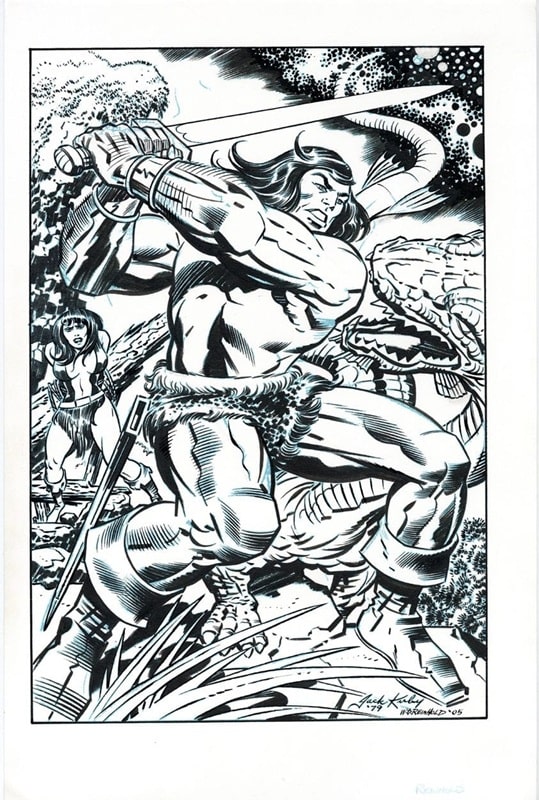 Conan by Jack Kirby
Conan by Jack Kirby
And here’s Conan the Barbarian, by Jack Kirby. Jack was not known for many Conan illustrations, but by Crom, this one is incredible.
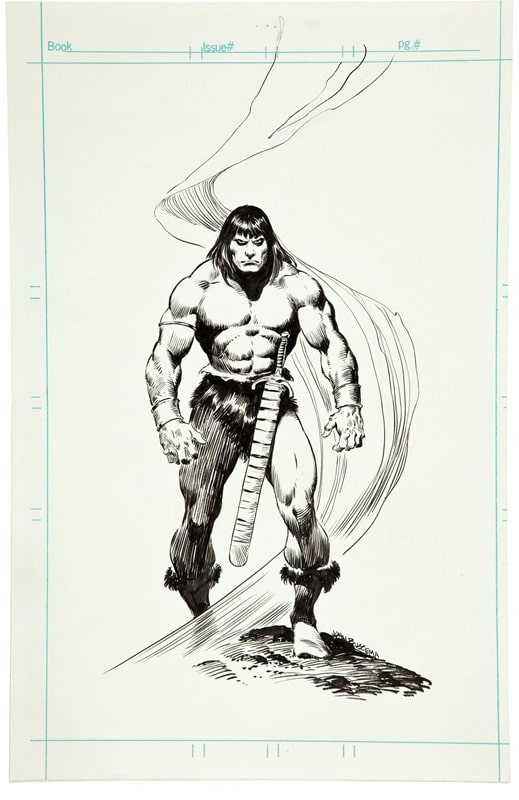 Conan by John Buscema
Conan by John Buscema
January 10, 2025 marked 23 years since the passing of the great John Buscema. His resume of artistic works is astonishing, to say the least, but for many of us (myself included), we will always remember him most for his Conan works (Conan the Barbarian, Savage Sword of Conan). When I read a Conan story (by REH or a pastiche author), and I picture Conan in my mind’s eye, I am seeing Big John’s rendition of the Cimmerian barbarian. Hail to John!
Jeffrey P. Talanian’s last article for Black Gate was The Intersection of Hobbies: Dungeons & Dragons, John Eric Holmes, and Tarzan. He is the creator and publisher of the Hyperborea sword-and-sorcery and weird science-fantasy RPG from North Wind Adventures. He was the co-author, with E. Gary Gygax, of the Castle Zagyg releases, including several Yggsburgh city supplements, Castle Zagyg: The East Mark Gazetteer, and Castle Zagyg: The Upper Works. Read Gabe Gybing’s interview with Jeffrey here, and follow his latest projects on Facebook and at www.hyperborea.tv.
Explore the Top 3 Rooftop Tents for Spring Camping 2025
As the weather warms up and nature beckons, spring camping becomes an enticing option for outdoor enthusiasts like you. Rooftop tents offer a unique way to experience the great outdoors, providing comfort and convenience while keeping you elevated and away from the ground. In this article, we will explore the top three rooftop tents for spring camping in 2025, helping you make an informed decision that enhances your outdoor adventures.
Top Picks- Best Overall: Naturnest Rooftop Tent – Andromeda Yellow – $999.00
- Best Value: Naturnest Rooftop Tent Hard Shell – Polaris 2 – $1,599.00
- Best for Families: Rooftop Tent Hard Shell – PEAKUNWIND – $1,999.00
When selecting the best rooftop tent for your spring camping needs, consider factors such as ease of setup, durability, weather resistance, and overall comfort. Each of these tents has been chosen based on their performance in these areas, ensuring you have a reliable shelter for your outdoor adventures.
Naturnest Rooftop TentThe Naturnest Rooftop Tent is your perfect companion for spring camping adventures. Designed for two, this tent offers a great view and excellent ventilation, making it ideal for stargazing or enjoying a gentle breeze while you relax. It’s lightweight at just 121 pounds, which means you can easily mount it on your vehicle without worrying about extra fuel consumption. Plus, it’s waterproof, windproof, and UV-resistant, ensuring you stay comfortable in various weather conditions. Whether you’re planning a weekend getaway or a longer road trip, this tent is a fantastic choice for both casual and serious campers.
What People SayUsers rave about the Naturnest Rooftop Tent’s ventilation and quality. Many appreciate how easy it is to set up and the comfort it provides, making it a favorite for outdoor enthusiasts.
-
My god, the ventilation and view of this tent are amazing. As you can see, it has doors and windows on all sides, and the top of the tent can also be opened. I drove to the suburbs and really tried to lie in the tent to see the stars. Guys, go outside and feel the nature. You will be grateful for it.
– GEORGE FREEMAN
-
I am impressed by the quality of this tent. The outer fabric is made of 420D Oxford cloth, which feels very thick and smooth, with no seam problems at all. It is completely waterproof, sun-proof, and completely blackout, providing a fully enclosed and safe interior space for outdoor camping.
– Julius Tayag
Pros:
- Excellent ventilation with multiple windows
- Lightweight design for easy transport
- High-quality materials ensure durability
Cons:
- Requires a vehicle with a roof rack for installation
- Great ventilation and view
- Lightweight and easy to install
- Durable and waterproof materials
Perfect for weekend camping trips, road trips, or even spontaneous outdoor adventures. The tent’s design allows you to enjoy nature without compromising comfort.
Current Price: $999.00
Rating: 5 (Total: 3+)
Naturnest Rooftop TentThe Naturnest Rooftop Tent is designed to elevate your spring camping experience. With a spacious layout for two, this tent not only provides a cozy spot to sleep but also offers stunning views and excellent ventilation. Weighing in at 185 pounds, it’s manageable for mounting on your vehicle, making it a practical choice for both weekend getaways and extended road trips. Plus, it’s built to withstand the elements—waterproof, windproof, and UV-resistant—so you can enjoy your adventures without worrying about the weather. Whether you’re stargazing or simply enjoying the fresh air, this tent is a fantastic addition to your outdoor gear.
What People SayUsers appreciate the Naturnest Rooftop Tent for its comfort and thoughtful design. Many highlight the ample storage options and the cozy mattress, making it a great choice for both casual campers and serious adventurers.
-
It is perfect for outdoor campers. It is very safe, the mattress is comfortable, the space is not too small, I think it can accommodate 2 people, it also has no condensation, and there are LED lights and multiple storage bags inside. Worth buying.
– lee jung ho
Pros:
- Comfortable mattress and spacious interior
- LED lights and storage bags enhance usability
- Durable construction for various weather conditions
Cons:
- Requires a vehicle with a roof rack for installation
- Spacious and comfortable for two
- Weather-resistant for all seasons
- Easy setup with thoughtful design features
This tent is perfect for weekend camping trips, spontaneous outdoor adventures, or even as a cozy retreat in your backyard. Its design allows you to enjoy nature comfortably, no matter where you are.
Current Price: $1,599.00
Rating: 5 (Total: 1+)
PEAKUNWIND Rooftop TentThe PEAKUNWIND Rooftop Tent is your go-to companion for spring camping adventures. With enough space for four people, this hard-shell tent is designed for comfort and convenience. Its Z-shaped design not only maximizes interior space but also ensures you can sit up comfortably without bumping your head. Setting it up is a breeze—just unlock the buckle, push up the ends, and let the air pressure rods do the work. Plus, it’s waterproof, UV-resistant, and built to withstand various weather conditions, making it perfect for both weekend getaways and longer trips. Whether you’re camping in the mountains or enjoying a night under the stars in your backyard, this tent is a fantastic choice.
What People SayUsers rave about the PEAKUNWIND Rooftop Tent for its spacious interior and hassle-free setup. Many appreciate the thoughtful accessories included, like the telescoping ladder and storage bags, which enhance the overall camping experience.
-
The Z-shaped design gives this rooftop tent plenty of space. I can sit and stretch without hitting my head, which is a huge plus. The extra room makes it perfect for longer trips.
– LEONARD W JOHNSON
Pros:
- Ample space for a comfortable camping experience
- Quick setup process saves time
- Includes useful accessories for convenience
Cons:
- Requires a vehicle with a roof rack for installation
- Spacious enough for four people
- Quick and easy setup
- Durable and weather-resistant materials
This tent is ideal for family camping trips, spontaneous adventures with friends, or even as a cozy escape in your own backyard. Its design allows you to enjoy the great outdoors comfortably, no matter where your travels take you.
Current Price: $1,999.00
Rating: 5 (Total: 3+)
FAQ What should I consider when choosing a rooftop tent for spring camping?When selecting a rooftop tent for spring camping, you should consider factors such as size, weight, and weather resistance. Ensure the tent can comfortably accommodate the number of people you plan to camp with. Look for lightweight options if you have a smaller vehicle, and prioritize tents with waterproof and windproof features to handle unpredictable spring weather. Additionally, check the setup time; a tent that can be easily assembled in under 10 minutes will save you time and hassle.
How do I maintain and care for my rooftop tent?To maintain your rooftop tent, regularly clean it with a mild soap and water solution to remove dirt and debris. Avoid harsh chemicals that could damage the fabric. After each use, ensure the tent is completely dry before packing it away to prevent mold and mildew. Store it in a cool, dry place when not in use. Additionally, inspect the seams and zippers periodically to ensure they are functioning properly and reseal them if necessary to maintain waterproofing.
Can I use a rooftop tent on any vehicle, and how do I ensure it fits my car?Not all rooftop tents are compatible with every vehicle, so it’s crucial to check the manufacturer’s specifications for compatibility. Most rooftop tents require a roof rack or crossbars that can support the tent’s weight. Ensure your vehicle’s roof can handle the combined weight of the tent and occupants. You can also consult with your vehicle’s manual or a professional to confirm the load capacity. If you’re unsure, consider visiting a local outdoor retailer for expert advice on fitting a rooftop tent to your specific vehicle.
Wrapping UpChoosing the right rooftop tent can significantly enhance your camping experience. The options highlighted in this article cater to various needs and preferences, ensuring that you can find the perfect fit for your adventures. Whether you prioritize comfort, value, or family-friendly features, these tents are designed to provide you with a memorable outdoor experience this spring.
Naturnest Rooftop Tent – Andromeda Yellow Naturnest Rooftop Tent – Polaris 2 Rooftop Tent Hard Shell – PEAKUNWIND

 Rating
5/5 (3 ratings)
5/5 (1 rating)
5/5 (3 ratings)
Highlights
Lightweight, waterproof, windproof, UV-resistant, 4-season tent for 2 persons.
Hard shell, easy setup, waterproof, windproof, UV-resistant, 4-season tent for 2 persons.
Hardshell, easy setup, blackout privacy, waterproof, UV-resistant, 4-season tent for 4 persons.
Pros
Excellent ventilation, great view, easy setup.
Comfortable mattress, spacious, no condensation.
Spacious interior, quick setup, sturdy design.
Cons
Higher price point.
Heavier than soft-shell options.
Most expensive option.
Price
$999.00
$1,599.00
$1,999.00
Buy Now
Buy Now
Buy Now
Rating
5/5 (3 ratings)
5/5 (1 rating)
5/5 (3 ratings)
Highlights
Lightweight, waterproof, windproof, UV-resistant, 4-season tent for 2 persons.
Hard shell, easy setup, waterproof, windproof, UV-resistant, 4-season tent for 2 persons.
Hardshell, easy setup, blackout privacy, waterproof, UV-resistant, 4-season tent for 4 persons.
Pros
Excellent ventilation, great view, easy setup.
Comfortable mattress, spacious, no condensation.
Spacious interior, quick setup, sturdy design.
Cons
Higher price point.
Heavier than soft-shell options.
Most expensive option.
Price
$999.00
$1,599.00
$1,999.00
Buy Now
Buy Now
Buy Now
The post Explore the Top 3 Rooftop Tents for Spring Camping 2025 first appeared on Rooftop Tents.
OUT NOW – The Unnatural Order (Schooled in Magic XXVII.
For generations, the Magicians of Celeste have chafed under at the limitations of the Compact, the treaties between the Magical and Mundane communities of the Allied Lands, and worked towards their abolition, envisaging a world in which magical supremacy would be established, allowing them to explore newer and greater fields of magic while keeping the powerless mundanes firmly under control. Their dreams were not taken seriously, until now.
With the end of the Necromantic Wars and the Allied Lands in disarray, they have finally stepped into the light and taken control of their city, declaring independence from the Allied Lands and creating a nightmare for both mundanes and any magicians who refuse to toe the line. And they don’t intend to stop. It is only a matter of time before they export their new regime to the rest of the continent, crushing anyone who stands in their way.
For Emily, who has traced the enigmatic Hierarchy to Celeste, there is no doubt that the new regime is an ally to a far older and darker threat. Millions of lives are at stake, thousands killed and tens of thousands more forced into slavery. The regime must be stopped, no matter the cost, before it imposes its own order on the entire world. But how can she prevail against an entire city of magicians, and a threat that has been decades in the making?
Download a FREE SAMPLE, then purchase: Amazon US, UK, CAN, AUS. Books2Read (other vendors). And read the Afterword here!


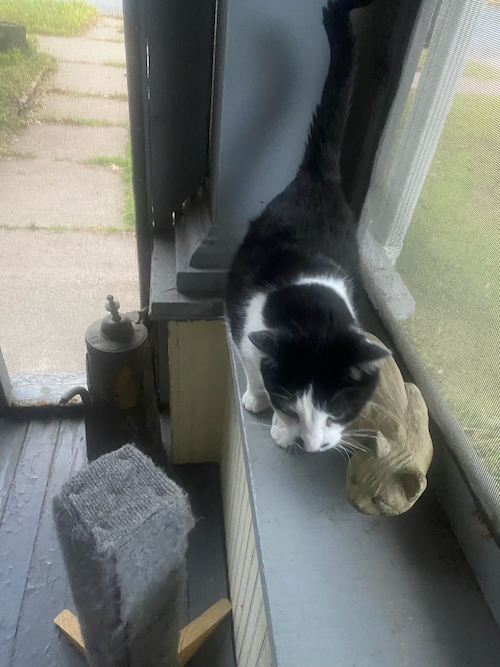
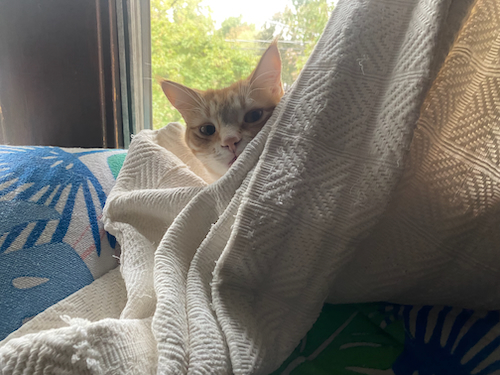
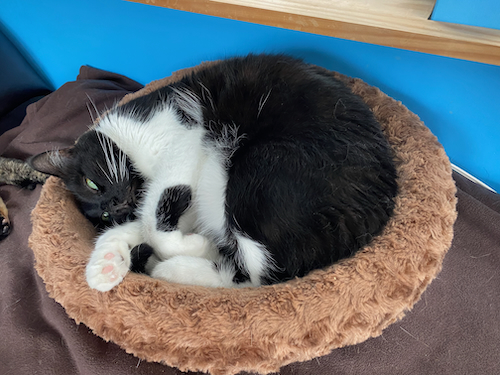
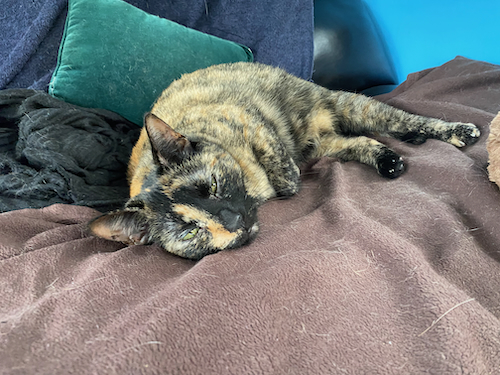

Recent comments